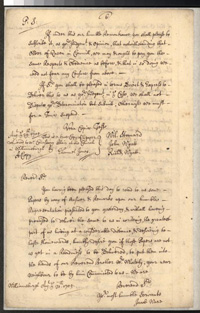MS43.04: Francis Nicholson Papers
Minutes of the meeting of Clergy of Virginia, 29 August-21 September 1705
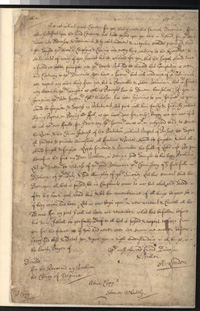
Brethren
It is not without great Concern for you, that I write this Generall Admonition; For—
when I Reflect upon the hard Censures that have passed upon you here in England, for yor. being—
drawn into Addresses, & Testimonials, & by what indecent & irregular Methods procured, how—
you Exposed Yo.rselves in Complying & Coming into every thing, contrary to the Knowledge, &—
Sentiments of many of you, I cannot but be ashamed for you, that the Gospell should have—
infused no better principles into Yo.r Hearts: But God be thanked that Temptation is over,—
and Contrary to Yo.r. Demeritts, You have a Govern:r that will need none of yo:r Testimonials,
nor expect any other thing from you, but a Peaceable & Sober Behaviour, that yo:r Flocks
may learn by Yo.r Examples as well as Precepts how to Demean themselves; If You—
Imagine, Yo.r late Govern.r Coll:o Nicholson, has been Injurious to you, forgive, as you—
would be forgiven, & Express no Resentment, but part with him fairly & friendly, without
Signing Papers, or Playing the Fool, as you have done formerly; Happy are you now if it
be not Yo.r own Faults, for I dare say, Yo.r Govern.r comes w.th an unbyased Mind, to Serve
the Queen, & the Comon Interest of the Plantation, without Respect of Persons; He Expects
all Grudges, & private Animosities, all Factions & Parties, should be forgotten, & that all—
should forgett & forgive. Look forwards, & Remember the Guilt of Lott's wife: Be You
therefore the first my Dear Brethren, in setting a good Example to this happy Revolution,
Let Yor Govern.r be Witness of Yo.r good Behaviour Yo.r Comissary of ye faithfull—
Discharge of Yo.r Duty, & God Almighty of yo.r Sincerity; Let this Moment Shutt the
Door upon all that is passed, let no Complaints come to me, but what are dated—
after the hour you read this, & let the remembrance of all things be gone, be as
if they never had been; Let us now begin upon a new account & Cancell all the
old ones. For my part I will not hear nor remember what has befallen before—
this time, I shall be perfectly Deaf to all that is passed & expect to hear from—
you for the future as if you had never seen nor known one another before;—
I pray God bless & Direct you, & give you a right understanding in all things, is—
the hearty Prayer of
Yo:r most assured Friend, Diocesan
& Brother
H: London
Directed
For the Reverend my Brethren
the Clergy of Virginia
A true Copy
Solomon Whately.
A copy./
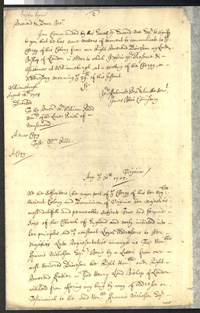
Reverend & Dear Bro:r
I am Commanded by his Excell:cy Edward Nott Esq.r to signify
to you that he has some Matters of Moment to communicate to ye—
Clergy of this Colony from our Right Reverend Diocessan my Lord
Bishop of London in Order to which, I desire yo.r Presence &—
Assistance at Williamsburgh, at a meeting of the Clergy, on—
Wednesday morning ye 29.th of this Instant
Sr.
Yo.r Affectionate Bro:r & humble Serv.t
James Blair Comissary
Williamsburgh
August 16.th 1705
Directed
To the Rever.d M.r William Rudd
Min.r of the Lower Parish of—
Nansemond.
A true Copy.
Test. Wm. Rudd.
A Copy.
Virginia
Aug. ye 30.th. 1705
We the Subscribers (the major part of ye Clergy of this Her Maj:ties:—
Ancient Colony and Dominion of Virginia, her Majesties—
most dutifull and peaceable Subjects True and Genuine—
Sons of the Church of England and early initiated into—
her principles, and ye constant Loyal Addressers to Her—
Majesties Late Representative amongst us The Hon:ble
Francis Nicholson Esq:r) Being by a Letter from our—
most Honored Diocesan the Right Hon:ble and Right—
Reverend Father in God Henry Lord Bishop of London
withheld from offering any thing by way of Addresse or—
Testimonial to the said Hon:ble Francis Nicholson Esq.r—
3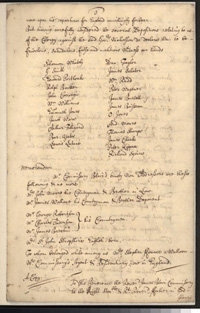 now upon his departure for England unwillingly forbear.
now upon his departure for England unwillingly forbear.
But having carefully considered the several Depositions relating to us—
of the Clergy against the said Gov.r Nicholson do declare them to be—
frivolous, Scandalous, false and malitious Witness our hands
Solomon Whately Dan: Taylor
G: Smith James Sclater
Edward Portlock
Wm. Rudd
Ralph Bowker Peter Wagener
John Carnegie James Burtell
W.m Williams James Boissean
Emanuel Jones O: Jones
Jacob Ware
Arthur Tillyard And: Monro
Thomas Sharpe
Bar: Yates
Lewis Latane James Clack
Peter Kippax
Richard Squire.
Memorandum
M.r Commissary Blair's trusty Non Addressors are these—
following & no more
M.r John Monro his Countryman & Brother in Law
M.r James Wallace his Countryman & Brother Deponent
M.r George Robertson
M.r Charles Anderson his Countrymen.
M.r James Brechin
M.r S.t John Shropshire English-born.
To whom belonged while among us M.r Stephen Fouace a Walloon—
M.r Commissary's Agent & Residentiary now in England.
A Copy.
To His Reverence the Rever.d James Blair Commissary
to the Right Hon:ble & R.t Rever.d Father in God—
4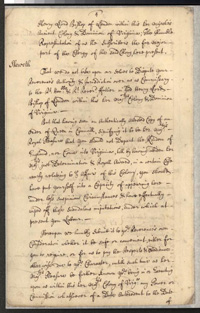 Henry Lord Bishop of London within this her Majesties
Henry Lord Bishop of London within this her Majesties
Ancient Colony & Dominion of Virginia; The Humble
Representation of us the Subscribers the far Major—
part of the Clergy of the said Colony, here present.
Sheweth
That we do not take upon our Selves to Dispute your—
Reverence's Authority & Jurisdiction over us as Commissary—
to the R.t Hon:ble & R.t Rever.d Father in God Henry Lord—
Bishop of London within this her Maj:tys Colony & Dominion
of Virginia.—
But that having seen an Authentically Attested Copy of an
Order of Queen in Councill, Signifying it to be her Majtys:—
Royal Pleasure that You should not Depart the Kindom of
England, nor Come into Virginia, till by having abiden her
Maj:ty's just Determination & Royall Award, in a certain Case
nearly relating to ye Affairs of this Colony, you should—
have put yourself into a Capacity of appearing here—
under less suspicious Circumstances, & have effectually—
wiped off those Scandalous imputations, under which at—
present you Labour.—
Hereupon We humbly Submitt it to yo:r Reverence's own—
Consideration whether it be safe or convenient, either for
you to require, or for us to pay the Respects & Obedience—
otherwise due to yo.r Character, untill such time as her—
Maj:ty's Pleasure be further known yo.r being in or Executing
upon us within this her Maj:ty's Colony of Virg:a any Power or
Commission whatsoever of a Date Antecedent to the Date
5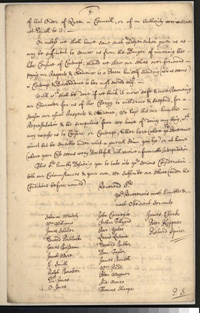 of that Order of Queen in Councill, or of an Authority
of that Order of Queen in Councill, or of an Authority or action
not Equall to it.—
Or unless we shall have some such Dispensation given us as—
may be sufficient to secure us from the Danger of incurring the—
like Censure of Contempt, should we shew our selves overforward in
paying our Respects, & Obedience to a Person himself Standing (as to us seems)
in Contempt & Disobedience to her most sacred Maj:ty—
Untill w.ch shall be done if we think it more safe & more Becomeing
our Character for us of thee Clergy to withdraw & Suspend, for a—
Season our usual Respects & Obedience; We hope this our humble—
Representation & the scrupulous fear we have of doing any thing, w.ch—
may expose us to Censure or Contempt, Either here (where yo.r Reverence
cannot but be sensible under what a generall Odium you lye) or at home
(where your Case seems very Doubtfull) will receive a favourable Interpritation.
Thus S.r humbly Desireing you to take into yo.r Serious Consideration—
both our Circumstances & your own, We Subscribe our Selves (under the
Conditions before named)
Reverend S.r
Yo.r Reverence's most humble &—
most Obedient Servants
Solomon Whately John Carnegie James Clack
W.m Williams Arthur Tillyard Peter Kippax
James Sclater Bar: Yates Richard Squire.
Edward Portlock Lewis Latane
James Boissean Edward Butler
Jacob Ware Dan: Taylor
G: Smith James Burtell
Ralph Bowker W.m Rudd
Peter Wagener
Em: Jones
And: Monro
O: Jones
Thomas Sharpe.
If under this our humble Remontrance you shall please to
Subscribe it, as yo.r Judgm.t & Opinion, that notwithstanding that—
Order of Queen in Councill, we may & ought to pay you the—
same Respects & Obedience as before, & that in so doing we—
need not fear any Censure from above.—
If S.r you shall be pleased in terms Direct & Express to—
Deliver this to us as Yo.r Judgem.t in ye Case, we shall not—
Dispute yo.r Determination but Submitt; Otherwise we must—
for a Time suspend.—
Vera Copia Teste
Aug.t ye 29.th 1705.This is a true Copy of ye paper
delivered to M.r Comissary Blair at the Church
in Williamsburgh by Emanuel Jones
A Copy.
Wil. Stanard
John Wyatt
Richd Wyatt.
Rever.d S.r
You having been pleased this day to read to us some—
Papers by way of Answer & Remarks upon our humble—
Representation presented to you yesterday, & withall havenig—
promised to deliver the same to us in writeing, the greatest
part of us liveing at a considerable distance, & desireing to—
haste Homewards, humbly desire you if those Papers are not
as yet in a Readiness to be Delivered, to put them into—
the hands of our Reverend Brother M.r Whately, your near
neighbour to be by him Comunicated to us—We are
Reverend S.r
Yo.r most humble Servants
Jacob Ware
Williamsburgh Aug.t ye 30.th 1705.
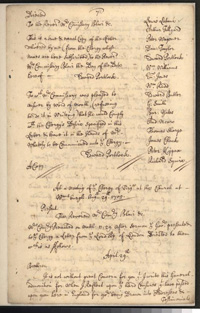
Directed
To the Rever:d M.r Comissary Blair &c
This is a true & exact Copy of the Letter
delivered by me (from the Clergy whose
Names are here Subscribed) to the Rever:d
M.r Comissary Blair the Day of the Date
hereof—
Edward Portlock.
Lewis Latane
Arthur Tillyard
Peter Wagener
Dan: Taylor
Edward Portlock
W.m Williams
Em: Jones
W.m Rudd
Edward Butler
G: Smith
Bar: Yates
And: Monro
Thomas Sharpe
James Clack
Peter Kippax
Richard Squire.
To w.ch M.r Comissary was pleased to
answer by Word of Mouth, (refuseing
to do it in Writeing) that He would Comply
w.th the Clergy's Desire Specifyed in this
Letter & leave it in the Hands of M:r—
Whately to be Communicated unto ye Clergy.—
Edward Portlock.
A Copy.
At a meeting of ye Clergy of Virg:a at the Church at—
Wmsburgh. Augst 29.th 1705.
The Reverend M.r. Com.ry Blair &c.
M.r Com.ry Preached on Matth: 11:29. After Sermon ye Gov.r presented
to ye Clergy a Letter from ye Lord Bp of London Directed to them
w.ch is as Follows.
April. 29th
Brethren
(It is not without great Concern for you y.t I write this General—
admonition for When I Reflect upon ye hard Censures y.t have passed—
upon you here in England for yo.r being Drawn into Addresses &—
8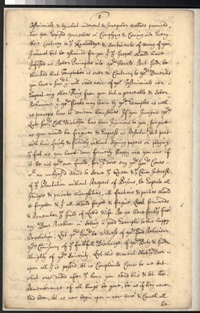 Testimonials & by what indecent & Irregular Methods procured,
Testimonials & by what indecent & Irregular Methods procured,
how you Exposed yourselves in Complying & Coming into Every—
thing Contrary to ye Knowledge & Sentiments of Many of you,
I cannot but be ashamed for you yt ye Gospel should have—
Infused no Better Principles into yo.r Hearts. But God be—
thanked that Temptation is over & Contrary to yo.r Demeritts
you have a Gov.r y.t will need none of yo.r Testimonials nor—
Expect any other Thing from you but a peaceable & Sober
Behaviour y.t yo.r flocks may learn by yo.r Examples as well—
as precepts how to demean themselves. If you Imagine yo.r
Late Gov.r Coll.o Nicholson has been Injurious to you, forgive
as you would be forgiven & Express no Resentm.t but part
with him fairly & friendly without Signing papers or playing
ye fool as you have done formerly. Happy are you now if
it be not yo.r own faults, for I dare say yo.r Gov.r Comes—
w.th an unbyas'd Mind to Serve ye Queen & ye Comon Interest
of ye Plantation without Respect of Persons, he Expects all
Grudges & private animosities, all factions & parties should
be forgotten & yt all should forgett & forgive, Look forwards
& Remember ye Guilt of Lott's Wife. Be ye therefore ye first
my Dear Brethren in Setting a good Example to this happy
Revolution; Let yo.r Gov.r be Witness of yo.r Good Behaviour
Yo.r Comissary of ye faithfull Discharge of yo.r Duty & God
Almighty of yo.r Sincerity. Let this Moment Shut ye Door—
upon all yt is passed, let no Complaints Come to me but—
what are dated after ye hour you read this & let the—
Remembrance of all things be gone, be as if they never
had been, let us now begin upon a new Acco:t & Cancell all
9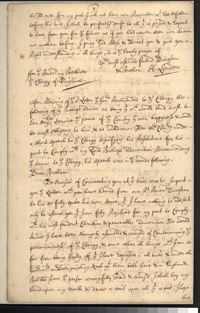 the old ones: For my part I will not hear nor Remember w.t has befallen—
the old ones: For my part I will not hear nor Remember w.t has befallen—
before this time, I shall be perfectly deafe to all yt is passed & Expect
to hear from you for y.e future as if you had never seen nor known
one another before. I pray God Bless & Direct you & give you a—
Right understanding in all things, it is ye hearty prayer of
Yo.r most assured friend Diocessan
& Brother
H: London
For ye Rever.d my Brethren
ye Clergy of Virginia.
After Reading of ye S.d Letter ye Gov.r Recomended to ye Clergy the—
following of y.r Bishops Advice as being yt w.ch would lend most to—
her Maj:ties Service ye peace of ye Country yo.r own happyness & would
be most Obliging to him, & so withdrew: Then M.r Com:ry made—
a short speech to ye Clergy Signifying his Resolutions for his—
part to Comply w.th my Lord Bishops Admonition Recommending
ye same to ye Clergy, his speech was in ye words following.
Dear Brethren
The Occasion of Convocating you at y.s time was to Impart—
you ye Letter wch you have heard from our R.t Rever.d Diocessan
he so fully spoke his own Sence, yt I have nothing to add, but
only to assure you yt I am fully Resolved for my part to Comply—
wth his most prudent Christian & peaceable admonition. The world
knows I have been strangely assualted & accused of Countenancing ye
precariousness of ye Clergy, & some other ill things, wch I am so
far from being Guilty off, yt I have Expressed in all times & under all
Gov.rnm.ts a Distinguishing Zeal ag.t them both here & in England.
But thô I am ye person wrongfully Tax'd & Accus'd, I shall lay my
hand upon my Mouth & draw a vail upon all y.t is past; I hope
10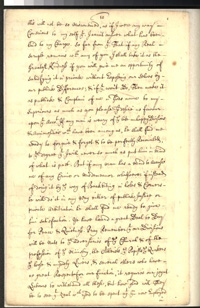 this will not be so Miscontrued, as if I were any way—
this will not be so Miscontrued, as if I were any way—
Conscious to my Self y.t I cann't answer what has been—
laid to my Charge. So far from y.t That if any Real—
scruple remains wth any of you, I shall take it as the—
Greatest Kindness if you will give me an opportunity of
Ssatisfying it in private without Exposing our Selves by—
our publick Differences; & if y.t won't Do, Then make it
as publick & Complain of me in Gods name to my—
Superiours as much as you please, I desire no favour—
upon y.t Acco.t If any man is weary of ye late unhappy Divisions
& Annimosities wch have been among us, he shall find me
ready to forgive & forget & to be perfectly Reconciled,
to yt degree y.t I will never so much as put him in mind
of what is past. But if any man has a Mind to Accuse
me of any Crime or Misdemeanor whatsoever if instead
of doing it by ye way of Backbiting in holes & Corners—
he will do it in any Way either of publick Justice or
private Arbitration he shall find me ready to give—
him satisfaction. Ye had heard a great Deal to Day
for Peace & Quietness. Pray Remember yt our Divisions
will be Nuts to ye Adversaries of ye Church & of the
profession of ye Ministry, the Atheists, ye Papists, ye Quakers
ye loose & ungodly Livers, & several other who have—
no great Respect for our function, it requires our joynt
Labours to withstand all these, but how glad will They
be so see y.t Zeal wch. used to be spent ag.t y.m now Employed
11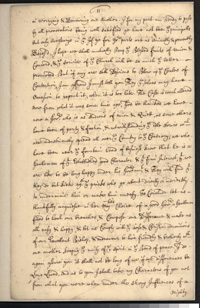 in worrying & Devouring one Another. I for my part am ready to pass
in worrying & Devouring one Another. I for my part am ready to pass
by all provocations being well satisfied ye have not been ye principalls
but only Accessarys in y.m If ye for Yo.r parts are as Amicably & peaceably
Dispos'd, I hope we shall mutually Reap ye Blessed fruits of Union &
Concord, & ye Service of ye Church will be so much ye better—
promoted. But if any are still Desirous to Blow up ye Coales of
Contention, I am affraid I must tell you They y.mselves may have—
Occasion to repent it, when it is too late. The Case is much altered
now from what it was some time ago, God be thanked we have—
now a Gov.r who is as studious of Union & Quiett, as some others
have been of party & faction, & notwithstanding ye idle stories wch
are industriously spread all over ye Country to ye Contrary; we who—
have been near ye fountain head of business know that he is a
Gentleman of y.t Established good Character & yt firm Interest, y.t we
are like to be long happy under his Gov.rnm.t & They will find y.t
they do but kick ag.st ye pricks who go about directly or indirectly—
to undermine him or make him uneasy. To Conclude let us—
thankfully acquiesce in her Maj:ties Choice of a good Gov:r a Gentleman
fitted to heal our breaches, & Compose our Difference & make us
all easy & happy, & let us Comply with ye wise & Christian admonitions—
of our Excellent Bishop, & endeavour to live friendly & brotherly wth
one another keeping ye unity of ye Spirit in ye Bond of peace. I do—
again assure you it shall not be long of me if our differences be
Long Lived, And as to you I shall take my Characters of you not
from what you were when under the Strong Influences of a—
12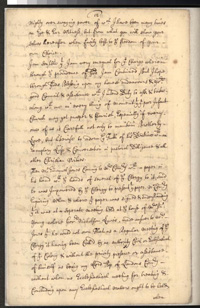 Mighty overswaying power of w.ch I have been many times
Mighty overswaying power of w.ch I have been many times
an Eye & Ear Witness, but from what you will show your
selves hereafter when fairly left to ye freedom of your—
own Choice.
I am sensible y.t I am very unequal for y.s Charge wherein
through ye providence of God I am Continued, But I hope
through Gods Blessing on my honest endeavours & Yo.r
good Council & assistance, wch I intend Duly to ask & take—
along wth me in every thing of Moment y.t y.s poor Infant
Church may yet prosper & flourish, Especially if every—
one of us is Carefull not only to maintain Brotherly—
Love, but likewise to adorn ye Truth of his Doctrine wth an
Exemplary Life & Conversation in pastoral Dilligence & all
other Christian Virtures.
Then M.r Emanuel Jones Coming to M.r Com.ry wth a paper in—
his hand wth ye hands of several of ye Clergy to it, said
he was Impowered by ye Clergy to present y.t paper. M.r Com.ry
Enquiring When & where yt paper was signed & understanding
yt it was at a seperate meeting held at ye house of M.r Jn:o
Young where Gov.r Nicholson Lives, made answer to M.r—
Jones y.t he could not own That as a Regular Meeting of ye
Clergy it having been Call'd by no authority Civil or Ecclesiastical
of y.s Colony & without the privity presence or assistance—
of himself as being my Lord Bp of Londons Com.ry—
without whom no Ecclesiastical meeting for treating &—
Concluding upon any Ecclesiastical Matters ought to be held
13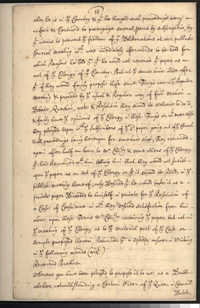 when he is in ye Country & y.t he thought such proceedings very—
when he is in ye Country & y.t he thought such proceedings very—
unfair & Contriv'd to preengage several Psons by subscriptions, by
y.t means to prevent ye freedom of y.r Deliberations at our publick
General Meeting wch was imediately afterwards to be held for
which Reasons he told ym y.t he could not receive yt paper as an
act of ye Clergy of y.s Country. But at ye same time made offer
y.t if they would fairly propose those same Things now in ye Regular
Meeting & proceed by ye usual & Regular way of fair Motion—
Debate, Question, vote & Resolution they should be Welcome to do it,
& fairly have ye Opinions of ye Clergy in those Things or w.tever else
they pleased. Upon w.ch ye Subscribers of ye S.d paper going out of ye Church
& all proceedings being thereupon for sometime stopt, They returned—
again after half an hour to M.r Com.ry & some others of ye Clergy
y.t had Remained wth him telling him that they would not Insist—
upon ye paper as an Act of ye Clergy or yt it should be Recd in ye—
publick meeting thereof, only Desired y.t he would take it as a—
private paper Directed to himself in private for ye Resolution of—
a Case of Conscience in wch they desired satisfaction from him—
alone, upon these Terms M.r Com.ry receiving ye paper but not in
ye meeting of ye Clergy as to ye material part of ye Case or—
Scruple proposed therein, Returned ym. a Speedy answer in Writing
in the following words (vizt.)
Reverend Brethren
Whereas you have been pleased to propose it to me as a Doubt
whether notwithstanding a Certain Order of ye Queen in Councill
14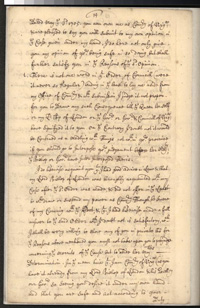 Dated May ye 3.d 1705. you can own me as Com.ry of Virg:a
Dated May ye 3.d 1705. you can own me as Com.ry of Virg:a
& are pleased to say you will Submit to my own opinion in
ye Case given under my hand, I do here not only give—
you my opinion of yo.r being safe in so doing, but shall
further sattisfy you in ye Reasons of ye S.d Opinion.
1. There is not one Word in y.t Order of Councill (were
it never so Regular) tending in ye least to lay me aside from
my Office of Com.ry & wth Submission I judge it not proper—
for you to Draw any such Consequence till ye Queen herself
or my L.d Bp of London or ye Gov.r or Gov.r & Counclil of Virg:a
have Signifyed it to you. On ye Contrary I doubt not it would
be Contrued as a Medling wth Things not w.thin yo.r province
if you should go to Interpose yo.r judgement before her Maj:ty,
ye Bishop or Gov.r have Interposed Theirs.
I do likewise acquaint you y.t I had good Advice in Law & that
my Lord Bishop of London was throughly acquainted wth my
Case after ye S.d Order was made, & did not offer in ye Least
to wthdraw or suspend my power as Com.ry Though he knew
of my Coming wth ye Fleet, & y.t I had likewise made a full
answer to ye said Order wch I doubt not is satisfactory, wch
I shall be very willing to show any of you in private thô for
ye Reasons above mentioned you must not take upon you to prejudge
concerning ye Merrits of ye Cause but to abide her Maj:ties—
Determination. In ye mean time y.t I am Com.ry of Virg:a (as you
have it already from my Lord Bishop of London & his Excell:cy
our Gov:r So Seeing you desire it under my own hand—
and that you are Safe & Act according to your—
15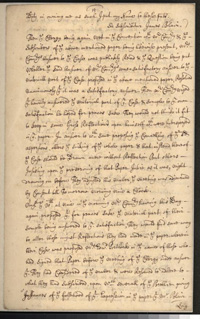 Duty in owning me as such I put my Name to these pnts.
Duty in owning me as such I put my Name to these pnts.
Sic Subscribitur
James Blair.
Then ye Clergy being again Met in ye Convention wth M.r Com.ry & ye—
Subscribers of ye above mentioned paper being likewise present, M.r—
Com.rys Answer to ye Case was publickly Read & ye Question being put
Whether ye said Answer of M.r Com.ry's was a Satisfactory Answer to ye
Materiall part of ye Case proposed in ye above mentioned paper, Resolved
Unanimously yt it was a Satisfactory answer. Then M.r Com.ry Urged—
y.t having answered ye Material part of y.r Case & Scruple to y.r own—
Satisfaction he hoped for peaces Sake They would not think it fit
to keep in some Gross Reflections upon himself wch were Interspersed
in ye. paper. In answer to wch some proposing ye Cancelling of ye Sd
aspersions, others ye Sinking of ye whole paper & that instead thereof
ye Case should be Drawn anew without Reflection But others—
Insisting upon ye preserving of that Paper Intire as it was, Night—
drawing on before They adjusted this Matter, ye meeting was adjourned
by Consent till To morrow Morning Nine a Clock.
Aug.st ye 30th. at Nine in ye morning M.r Com.ry having this Day—
again proposed y.t for peaces Sake ye Material part of their—
Scruple being answered to y.r satisfaction, They would find some way
to alter those unjust Reflections they had made in ye paper wherein
their Case was proposed. M.r Edw.d Portlock in ye name of those who—
had Signed that Paper before ye meeting of ye Clergy made answer
y.t They had Considered of ye matter & were Resolved to adhere to—
what they had Subscribed, upon Wch severall of ye Brethren giving
Instances of ye falsehood of y.t Expression in ye paper y.t M.r Blair—
16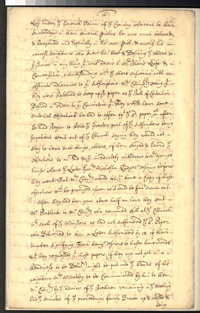 Lay under ye General Odium of ye Country whereas to their
Lay under ye General Odium of ye Country whereas to their
knowledge in their several Pshes he was much beloved
& Respected and Especially in his own Pish, & among his—
nearest Neighbours who knew him best & Desiring ye others to—
Instance in any thing y.t was odious in M.r Blair's Life &—
Conversation, Notwithstanding wch ye others Answering with an
obstinate adherance to y.r Subscriptions. Mr Comiss.ry seeing y.t—
they were Resolved to keep up y.s paper as ye Ball of Contention
Desired in order to y.r Conviction y.t They would hear some—
Material Objections he had to offer ag.t ye Sd paper, wch after
he had Begun to Read ye Greater part of ye Subscribers being
Impatient went out of ye Church Saying they would not—
stay to hear such things, others of them Stayed & heard ye
Objections to an End & y.n imediately withdrew to M.r Youngs
house where ye Late Gov.r Nicholson Lodges desiring before
they went That M.r Com.ry would let y.m have a Copy of those
objections wch he promised as soon as it could be fair drawn out.
After they had been gone above half an hour they sent—
M.r Portlock to M.r Com.ry who Remained still at ye Church
w.th such of ye Ministers as had not Subscribed ye S.d Paper
who Delivered to him a Letter Subscribed by 12 of their—
Number Signifying Their being desirous to hasten homewards—
& yt they requested y.t those papers (if they are not yet in a—
Readiness to be Deliv.d) might be put into ye hands of his
neighbour M.r Wheatley to be Communicated by him to them.
M.r Com.ry by ye advice of ye Brethren remaining in ye Meeting
had ye Minutes of ye proceedings fairly Drawn up & attested &
17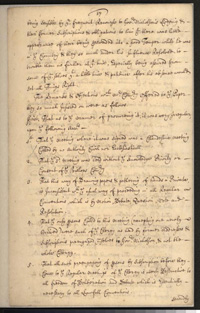 being Sensible by y.r frequent Recourse to Gov.r Nicholson Lodging &—
being Sensible by y.r frequent Recourse to Gov.r Nicholson Lodging &—
their former Subscriptions & obligations to him y.t there was little—
appearance of their being Pswaded into a good Temper while he was
in ye Country & they so much under his Influence Resolved to—
trouble them no further at y.s time, Especially being assured from—
some of y.mselves y.t a little time & patience after his absence would
Set all Things Right.
The Remarks & Objections wch M.r Com.ry Offered to ye Paper—
they so much Insisted on were as follows.
First, That as to ye manner of procureing it, it was very Irregular,
upon ye folllowing Acco.ts—
- 1.st That ye meeting where it was signed was a Clandestine meeting
Called by no Authority Civil nor Ecclesiasticall. - 2.That ye S.d meeting was held without ye knowledge Privity or—
Consent of ye Bishops Com.ry - 3.That this way of Drawing papers & gathering of hands in Private,
is Inconsistent wth ye usual way of proceeding in all Regular—
Conventions, which is by Motion, Debate, Question, Vote and—
Resolution. - 4.That ye only Psons Call'd to this meeting (excepting one newly—
Arrived) were such of ye Clergy as had by former Addresses &
Subscriptions preengaged y.mselves to Gov.r Nicholson, & not the—
whole Clergy. - 5.That all such preengaging of Psons by Subscription before they—
Come to ye Regular meetings of ye Clergy is utterly Destructive to
all freedom of Deliberation and Debate, which is Essentially—
necessary to all Lawfull Conventions.
18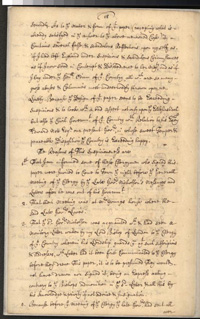 Secondly. As to ye Matter & form of y.t paper (excepting what is—
Secondly. As to ye Matter & form of y.t paper (excepting what is—
already satisfyed in ye answer to ye above mentioned Case) it—
Contains several false & scandalous Reflections upon my self as—
if I had left England under Suspicious & Scandalous Circumstances,
as if I now stood in Contempt & Disobedience to her Majty; and as if
I lay under ye Gen:ll Odium of y.s Country, all wch are so many—
gross abuses & Calumnies most undeservedly thrown upon me.
Lastly. Because ye Design of y.t paper seems to be Exceeding—
Suspicious & to look wth a bad Aspect not only upon ye Ecclesiastical
but also y.e Civil Governm.t of y.s Country
wth Relation to his Excy
Edward Nott Esq.r our present
Gov.r, in whose sweet Temper &
peaceable Disposition ye Country is Exceeding happy.
The Reasons of This Suspiciousness are
- 1.stThat I am informed some of these Clergymen who signed this—
paper were Invited to Come to Town ye night before ye Generall
meeting of ye Clergy by ye Late Gov.r Nicholson's Messages and
Letters after he was out of his Governm.t - 2.That their meeting was at M.r Youngs house
where the—
said Late Gov.r Lives. - 3.That ye Sd Gov.r Nicholson was acquainted wth & had seen a
Monitory Letter written by my Lord Bishop of London to ye Clergy
of y.s Country wherein his Lordship guards y.m ag.st such Subscriptions
& Addresses, w.ch Letter had it been first Communicated to ye Clergy
before they drew This paper, it is to be presumed They would—
not have drawn nor Signed it, being an Express acting—
contrary to ye Bishops admonition in ye sd Letter, & all this by
his knowledge & privity if not advice & Insignation. - 4.Because before y.s meeting of ye Clergy ye late Gov.r had sent all
19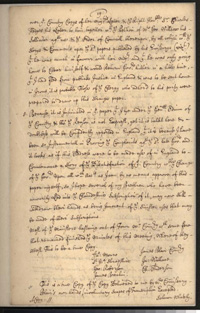
 over y.s Country Copys of her Maj:ty's Letter & ye Right Hon:ble S.r Charles—
over y.s Country Copys of her Maj:ty's Letter & ye Right Hon:ble S.r Charles—- 5.Because it is Insinuated in y.s paper y.t I lye under ye Gen:ll Odium of
ye Country & thô ye Reason is not Exprest, yet it is talkt here &—
doubtless will be Confidently reported in England, y.t is because I have
been so Instrumentall in Proving ye Complaints ag.st ye sd late Gov.r and—
it looks as if this Address were to be made use of in England to—
Countenance a Story of ye Dissatisfaction of y.s Country w.th ye Change
of ye Gov.r Upon all wch Acc.ts as I can by no means approve of this—
paper myself, so I hope several of my Brethren who have been—
unwarily Led into ye Clandestine Subscription of it, may now Still—
withdraw their hands as being Innocent of ye Sinister uses that may
be made of their Subscriptions.
Hodges his Letter to him together w.th ye Petition of M.r Geo: Willcox his—
Sollicitor ag.st me & ye Order of Councill thereupon, by all which w.th ye
Storys & Comments upon ye s.d papers published by his Emissarys (viz.t)—
y.t he was much in favour with her Maj:ty and y.t he was only going
home to Clear himself & would Return Gov.r hither in a little time,—
y.t I had fled from publick Justice in England & was to be sent home
in Irons, it is probable Those of ye Clergy who adher'd to his party were
prepared to draw up this Strange paper.
Most of ye Ministers hastening out of Town M.r Com:ry w.th some few
that remained finished ye Minutes of this Meeting, Whereof they—
Attest This to be a true Copy.
James Blair Comi.ry
Jn:o Monro
S.t Jn:o Shropshire Ja: Wallace
Geo: Roberson Ch: Anderson
James Brechin.
This is a true Copy of ye Copy Delivered to me by M.r Comissary—
Blair's own hands, (involuntary Scapes of Transcription Excepted.
Solomon Whately.
A Copy.
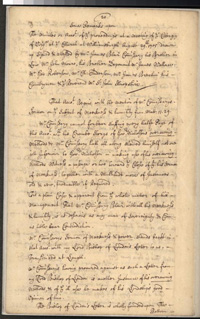
Some Remarks upon
The Minutes or Acco.t of ye proceedings at a Meeting of ye Clergy
of Virg:a at ye Church at Williamsburgh August 29.th 1705. drawn
up Signed & attested by M.r James Blair Comissary his Brother in
Law M.r John Monro, his Brother Deponant M.r James Wallace:
M.r Geo: Roberson, M.r Ch: Anderson, M.r James Brechin his—
Countrymen & ye Reverend M.r S.t John Shropshire.
That Acco.t Begins with the mention of M.r Comissarys—
Sermon on ye Subject of Meekness & humility from. Matt: 11.29.
Mr. Comissary cannot forbear stuffing every halfe Page of
this Acco.t wth his Crambe Storys of Gov.r Nicholsons overawing—
Methods &c. Mr Comissary hath all along shewed himself not one
jott Inferiour to Gov.r Nicholson in making use of his overawing
Methods Witness a passage or two toward ye Close of y.t his Sermon
of Meekness, together with a Multitude more of Instances—
old & new, producible if Required.
'Tis a plain Case & apparent from ye whole matter of his—
Management That M.r Comissary Blair with all his meekness
& humility, is as desirous as any man of Sovereignty & Can—
as litle bear Contradiction.
M.r Comissarys Sermon of Meekness & power stands backt in—
that Acco.t with my Lord Bishop of London's Letter to us,—
Transcribed at Length.
M.r Comissary's having procured against us such a Letter from
my Lord Bishop of London is another Instance of his overawing
Methods, & of ye ill use he makes of his Lordship's good—
Opinion of him.
The Bishop of London's Letter is wholly founded upon The—
21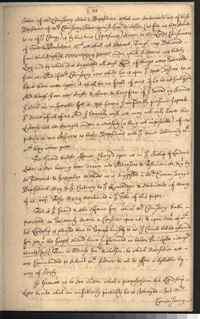 Bottom of M.r Comissary Blair's Depositions. What our Sentiments are of those
Bottom of M.r Comissary Blair's Depositions. What our Sentiments are of those
Depositions of M.r Comissary Blair against Gov.r Nicholson (as far as they Relate
to us of ye Clergy) is by this time (I presume) known to the Lords Comissioners
of Trade & Plantations. W.ch we shall not Retract, Though now Delivered—
from that Mighty overswaying power under which it seems, we lately—
Lay, and by which it is suggested all such Kind of things were Extorted—
from us. And if M.r Comissary now while he is upon ye Spott, desires to—
have them over again it shall be no fault of ours if he be not Gratfyed.
And though I am now Single & alone, & therefore if I Exceed my Bounds
I alone am unswerable for it: Yet herein I confidently presume I speak—
ye Sence of all of us, And I heartily wish we may not only have the
Liberty but be brought under a necessity (a thing not impossible) of—
putting in our Answers to those Depositions with ye same Solemnity wth
wch they were given.
The Grand & Sole offence Charg'd upon us in ye Bishop of London's
Letter is Our having been drawn into Addresses & Testimonials, and y.t by
so Indecent & Irregular Methods as is Suggested in M.r Commissary's
Depositions: Nay & y.t Contrary to ye Knowledge & Sentiments of Many
of us, (viz.t) Those Many Mentioned in ye Title of this paper.
This is y.t Grand & Sole Offence for which M.r Comissary hath—
procured so Extreamly Severe a Censure upon us; & upon Acco.t of wch
his Lordship is pleased thus to Express himself to us. I Cannot but be ashamed
for you y.t the Gospel should have Influenced no better Principles into yor.
hearts.) (vizt.) Than to Address Gov.r Nicholson, to which Accusation we—
are Commanded to Submit wth Silence & not to offer a Syllable by—
way of Reply.
It Greives us to see under what a prepossession his Lordship—
Lyes & into what an unfatherly partiality he is Betrayed. But M.r
Commissary—
22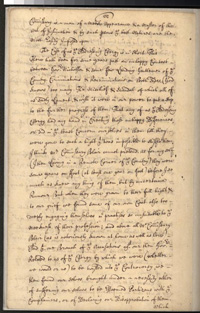 Comissary is a man of a meek Appearance & a Master of the—
Comissary is a man of a meek Appearance & a Master of the—
Art of Insinuation & by such Psons ye best Natures are the—
Most Easily imposed upon.
The Case of us ye Addressing Clergy is in Short This
There hath been for some years past an unhappy Contest—
between Gov.r Nicholson & some few Leading Gentlemen of ye
Country. Criminations & Recriminations on Both Sides (God
knows) too many: The Mischief & Scandal of which all of
us Sadly Lament, & wish it were in our power to put a Stop
to the further progress of them. That any of us ye Addressing
Clergy had any hand in Creating those unhappy Differences,
or did in ye least Concern ourselves in them till they—
were gone to such a hight y.t 'twas impossible to Stiffle them,
I think M.r Comissary Blair cannot pretend. As for myself,
(I then Living in a Remote Corner of ye Country) they were
some years on Foot (at least one year on foot) before I so
much as knew any thing of them, but by uncertaine—
Rumour. But when they were grown to their full hight, &
to our grief we found some of our own Coat also too—
deeply engaging themselves in practises so unsuitable to ye
meekness of their profession; and above all M.r Comissary
Blair (as is notoriously known at home as well as here)—
And y.t one Branch of ye Accusations ag.st our then Gov.r—
Related to us of ye Clergy by which we were (whether—
we would or no) to be twisted into ye Controversy, we—
then found our selves brought under a necessity either
of suffering our selves to be Esteemed Partizans with ye
Complainers, or of Declaring our Disapprobation of them,
23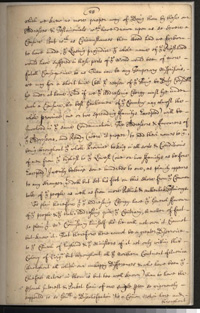 Which we knew no more proper way of Doing than by these our
Which we knew no more proper way of Doing than by these our
Addresses & Testimonials wch have drawn upon us so Severe a
Censure. But wch as Circumstances then stood had we forborn—
to have made, ye Lasting praejudice ye whole name of ye Priesthood—
would have Suffered in these parts of ye World would been of more—
fatall Consequence to us Than can be any Temporary Misprisions,—
we may for a short time (till ye reason of ye Thing be Duly Consider'd)
lye under at home. And if we ye Addressing Clergy must lye under
such a Censure, the best Gentlemen of ye Country nay almost the—
whole province (one or two spreading Familys Excepted) will be—
Involved in ye same Condemnation. The Addressors & Favourers of
ye Addressors, and Ready (were it proper) to add their names to y.m,
being throughout ye whole Province taking in all sorts & Conditions
of men from ye highest to ye Lowest (one or two Familys as before
Excepted) I verily beleive some hundreds to one, as plainly appears
to any Stranger y.t doth but Set his foot on this Shore from ye Common
talk of ye people as well as from more Publick & authenitick Testimonys.
'Tis plain therefore yt ye Addressing Clergy have ye General Favour
of ye people & ye Anti-Addressing quite ye Contrary, A matter of fact—
so plain y.t M.r Comissary himself thô he will not own it Cannot
but know it. That therefore there cannot be a greater Disservice—
to ye Church of England & ye Ministers of it not only with this—
Colony of Virg:a but throughout all ye Northern Continent of America
(throughout all which our unhappy Differences & who have been ye—
Chiefest Actors in them is but too well known) than to have the—
Psonal Interest & Pocket Gain of one single Pson so vigorously—
supported to so Gen:ll a Dissatisfaction 'tis a Comon Notion here and—
24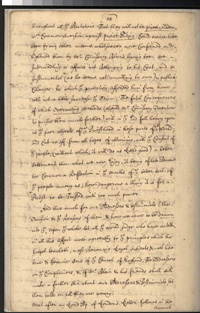 throughout all ye Plantations That they will not be priest-ridden,
throughout all ye Plantations That they will not be priest-ridden,
w.ch Common Aversion against priest Riding Could scarce have
been by any other means whatsoever more Confirmed and—
hightned than by Mr Comissary Blair's having been soe—
Intermedling in affairs not Belonging to his Coat, and so
Instrumental (as he seems not unwilling to own) in publick
Changes: to which ye protection Afforded him from home—
doth not a little Increase ye Odium. The fatal Consequences
of which Overawing Methods (should Mr Comissary adventure
to pursue them much farther) will in ye End fall heavy upon
us ye poor abjects of ye Priesthood in these parts of ye World;
and Cut us off from all hopes of obtaining, with ye Consent of
ye people, (without which, it will do us Little good) a better
Settlement than what we now Enjoy, it being of late Become
too Common a Reflection in ye Mouths of ye better sort of
ye people among us, how dangerous a thing it is for a—
Priest to be Trusted with too much power.
And thus much for our Addresses & testimonials: the—
Occasion & ye Reasons of them, & how we came to be drawn
into y.m, Upon ye whole lot all ye world judge who have acted
in all this Affair most agreeably to ye principles which the
Gospel teacheth, most Becoming Loyal Subjects, & most like
true & Genuine Sons of ye Church of England; The Addressors
or ye Complainers, & if M.r Blair & his friends shall still
make a father Stir about our Addresses & Testimonials, let
them talk on till they are weary.
Next after my Lord Bp. of London's Letter follows in the
25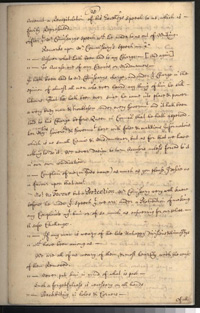 Account a Recapituation of his Excell:cys speech to us, which is—
Account a Recapituation of his Excell:cys speech to us, which is—
fairly Represented.
After y.t M.r Comissarys speech wch he made to us out of Writing.
Remarks upon M.r Comissary's Speech—+a.a
″—Answer what hath been laid to my Charge——[And again]
″——To Accuse me of any Crimes or Misdemeanors—
It hath been laid to M.r Comissarys charge, and under y.t Charge in the
opinion of almost all men who ever heard any thing of him he still—
labours. That he hath been ever since he came into place & power
a very busy man & troublesom under every Governmn.t and it hath been
laid to his Charge before Queen in Council that he hath aspersed—
her Maj:ties Govern.r & Governm.t here with false & malitious Informations:
which is no small Crime & Misdemeanor, but as for that we have
nothing to do it. We never design to turn Accusers unless forced to it
in our own vindication.
″—Complain of me (in Gods name) as much as you please, I desire no
″favour upon that accot.
No! No Favour but a Protection. M.r Comissary very well knew
before he made y.t speech y.t we are under a Prohibition of making
any Complaints ag.t him or of so much as answering for ourselves.—
A safe Challenge.
″—If any man is weary of the late Unhappy divisions & Animositys
″wch have been among us.—
We are all of us weary of them, & most heartily wish the cause
of them Removed.
″— Never put him in mind of what is past—
Such a forgetfulness is necessary on all hands.
″— Backbiting in holes & Corners—
26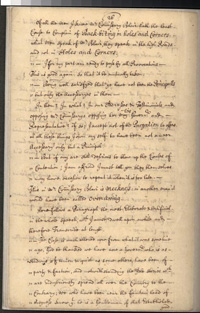 Of all the Men I know M.r Comissary Blair hath the least—
Of all the Men I know M.r Comissary Blair hath the least—
Cause to Complain of Back-biting in holes and Corners.—
what Men speak of M.r Blair, they speak in the high Roads—
and not in Holes and Corners.
″— I for my part am ready to pass by all Provocations—
This is good again: So that it be mutually taken.
″— Being well satisfyed that ye have not been the Principalls
″but only the Accessaryes in them—
In them? In what? In our Addresses & Testimonials and
opposing M.r Comissarys opposing her Maj:ties Govern:r and—
Representative? if so; I accept not of the Purgation he offers.
in all these things I own my self to have been not a meer
Accessary only but a Principal.
″—But if any are still desirous to blow up the Coales of
″Contention; I am affraid I must tell you they themselves
″may have occasion to repent it when it is too late.—
This in M.r Comissary Blair is Meekness in another Man it
would have been called Over-Awing.
Here follows a Paragraph the most Elaborate & Artificial—
in the whole Speech, wch I must dwell upon awhile and—
therefore Transcribe at length.
″—The Case is much altered now from what it was sometime
″ago, God be thanked we have now a Govern.r who is as—
″Studious of Union & quiet as some others have been of—
″party & faction, and notwithstanding the Idle stories wch
″are industriously spread all over the Country to the—
″Contrary; We who have been near the fountain head of—
″busyness know y.t he is a Gentleman of that Established
27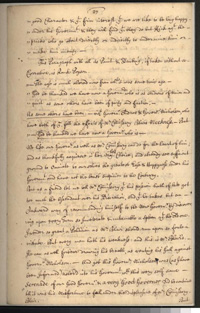 ″good Character & y.t firm interest, y.t we are like to be long happy—
″good Character & y.t firm interest, y.t we are like to be long happy—
″under his Governm.t & they will find y.t they do but Kick ag.t the—
″pricks who go about directly or indirectly to undermine him or—
″make him uneasy.—
This Paragraph with all its Paint & Daubing, if taken without a—
Corrective, is Rank Poyson.
″—The case is much altered now from wh.t it was some time ago.—
″God be thanked we have now a Govern.r who is as Studious of Union and
″quiet as some others have been of party and faction,—
As some other have been.— viz.t Govern.r Andros & Govern.r Nicholson, who
have both of y.m felt the effects of M.r
Comissary Blairs Meekness.—But
″—God be thanked we have now a Govern.r who is—
We like our Govern.r as well as M.r Comissary can do for the heart of him;
and as thankfully acquiesce in her Maj.ties Choice; and already see sufficient
ground to Ominate to ourselves the greatest Ease & Happyness under his
Governm.t and have not the least suspicion to the Contrary.
But as a friend let me tell M.r Comissary y.t his passion hath of late got
too much the Ascendant over his Discretion, And y.t he takes but an—
Awkward way of recommending himself to the New Govern.r by discover-
ing upon every Turn so Inveterate & untamable a Spleen ag.t the Old one.
I wonder so great a Polititian as M.r Blair should run upon so foule a
mistake. But every man hath his weakness: and this is M.r Blair's.—
He can as well forbear drawing his breath, as venting his Gall against
Govern.r Nicholson.—And yet this Govern.r Nicholson was (as I have
been Informed) Usher'd into his Governm.t w.th this very self same—
Serenade of our Good Govern.r & a very Good Governor did he continue
till it was his Misfortune to fall under the displeasure of M.r Comissary—
Blair.
28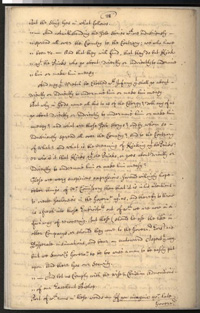 But the Sting lyes in what follows.
But the Sting lyes in what follows.
″—And notwithstanding the Idle Stories w.ch are industriously—
″spread all over the Country to the Contrary; we who have
″been &c.—And that they will find, that they do but Kick
″ag.t the Pricks who go about directly or indirectly to undermine
″him or make him uneasy.
And may y.t Wretch be Clothed w.th Infamy y.t shall go about—
directly or indirectly to undermine him or make him uneasy.
But why in Gods name all this to us of the Clergy? doth any of us
go about directly or indirectly to undermine him or make him
uneasy? and what are those Idle Storys? and by whom so—
industriously spread all over the Country? And to the Contrary
of What? and what is the Meaning of Kicking ag.t the Pricks?
or who is it that Kicks ag.t the Pricks, or goes about directly or
indirectly to undermine him or make him uneasy?
These are very suspicious expressions. I would willingly hope—
better things of M.r Comissary than that it is in his intentions—
to create Jealousies in the Govern.r ag.t us, and thereby to throw
us a fresh into those Embroilm.ts out of wch we are now in a—
fair way of recovering. But these (should he use the like in—
other Companys, or should they come to the Governo.rs Ears) are
Desperate insinuations, and bear an untoward Aspect y.t way.
but we know ye Govern.r to be too wise a man to be easily put
upon: And there lyes our Security.
″—And let us Comply with the wise & Christian Admonitions—
″of our Excellent Bishop.
Part of w.ch runs in these words—If you imagine yo.r late—
29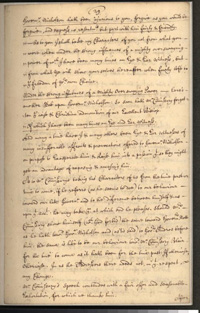 Govern.r Nicholson hath been injurious to you, forgive as you would be
Govern.r Nicholson hath been injurious to you, forgive as you would be
forgiven, and express no resentm.ts but part with him fairly & friendly.
″—— As to you I shall take my Characters of you not from what you—
″were when under the strong influences of a mightly overswaying—
″power of w.ch I have been many times an Eye & Ear Witness, but—
″from what Ye will show yourselves hereafter when fairly left to
″y.e freedom of Yo.r own Choice.
Under the strong influences of a Mighty Overswaying Power—here's—
another Dab upon Govern.r Nicholson: So soon hath M.r Comissary forgot-
ten ye wise & Christian admonition of our
Excellent Bishop.
″Of which I have been many times an Eye and Ear Witness.
And many a time have I & many others been Eye & Ear Witnesses of
many insufferable affronts & provocations offered to Govern.r Nicholson—
on purpose to Exasperate him & Raise him into a passion y.t so they might
gett an advantage of exposing & accusing him.
As to M.r Comissary's taking his Characters of us from the time past or
time to come, if he referrs (as he seems to doe) to our behaviour—
toward our late Govern.r and to the difference between himself & us—
upon y.t Acc.t: he may take y.m at which end he pleases. Should M.r—
Comissary show himself (w.ch God forbid) the same toward Govern.r Nott
as he hath tow.d Gov.r Nicholson and (as 'tis said) to Gov.r Andros before
him: the same is like to be our behaviour tow.d M.r Comissary Blair—
for the time to come as it hath been for the time past: If otherwise,
Otherwise. In us the Addressers there needs not, in y.t respect,—
any Change.
M.r Comissary's Speech concludes with a fair offer and Seasonable—
Exhortation, for which we thank him.
30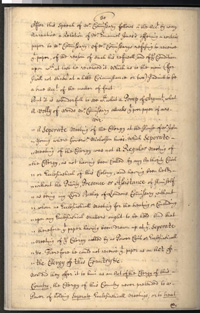 After this Speech of M.r Comissary follows in the Acc.t by way
After this Speech of M.r Comissary follows in the Acc.t by way
Narrative a Relation of M.r Emanuel Jones's offering a certain
paper to M.r Comissary: of M.r Comissarys refusing to receive
y.t paper, of the reason of such his refusall, and of ye Condition
upon w.ch at last he received it. Which as to the main (for
I will not stick at a little Circumstance or two) I admitt to be
a true Acc.t of the matter of fact.
But, it is wonderfull to see w.th what a Pomp of Argum.t, what
A Volly of words M.r Comissary attacks y.t poor paper of ours.
viz.
″A Seperate Meeting of the Clergy at the House of M.r John
″Young where Govern.r Nicholson lives. Which Seperate—
″meeting of the Clergy was not A Regular Meeting of
″the Clergy, as not having been Called by any Authority Civil
″or Ecclesiastical of this Colony, and having been held—
″without the Privity, Presence or Assistance of Himself
″as being my Lord Bishop of Londons Comissary, without
″whom no Ecclesiasticall Meeting for the treating or Concluding
″upon any Ecclesiastical Matters ought to be held: And that
″therefore y.t paper having been drawn up at y.t Seperate
″Meeting of ye Clergy called by no Power Civil or Ecclesiasticall
″&c. Therefore he could not receive y.t paper as an Act Of—
″the Clergy of this Country &c.
Nor did they offer it to him as an Act of the Clergy of this—
Country, the Clergy of this Country never pretended to a—
Power of holding Seperate Ecclesiasticall Meetings; or to treat
31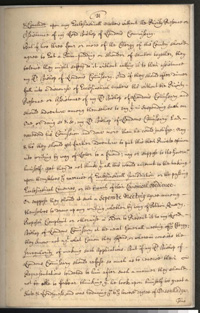 & Conclude upon any Ecclesiasticall Matters without the Privity Presence or
& Conclude upon any Ecclesiasticall Matters without the Privity Presence or
Assistance of my Lord Bishop of London's Commissary.
But if two three four or more of the Clergy of this Country should
agree to Eat a Plum-pudding or Shoulder of Mutton together, they
believe they might safely do it without calling in to their assistance
of my L.d Bishop of London's Comissary. And if they should after dinner
fall into a discourse of Ecclesiastical Matters thô without the Privity—
Presence or Assistance of my L.d Bishop of London's Comissary, and
should adventure among themselves to say y.t in Suspending such an—
One, or doing so & so, my L.d Bishop of Londons Comissary had—
exceeded his Comission and done more than he could justifye: Nay—
& thô they should yet farther adventure to put this their Private opinion
into writing by way of Letter to a friend; nay or suppose to the Govern.r
himself: Yet they do not think y.t all this would amount to the taking
upon themselves ye exercise of Ecclesiasticall Jurisdiction or the passing
Ecclesiastical Censures, or the breach of their Canonical Obedience.
Or suppose they should at such a Seperate Meeting Agree among—
themselves to draw up any writing, whether by way of Petition, Quaery,—
Proposal Complaint or otherwise in order to Present it to my Lord—
Bishop of Londons Comissary at the next Generall meeting of ye Clergy:
they know not ag.t what Canon they offend, or wherein consists the
Irregularity of making such Applications. But if my L.d Bishop of—
Londons Comissary should refuse so much as to receive their—
Representations tendered to him after such a manner they should—
not be able to forbear thinking y.t he took upon himself too great a
State & Lordlyness, and was reducing y.m to ye lowest degree of Vassalladge.
32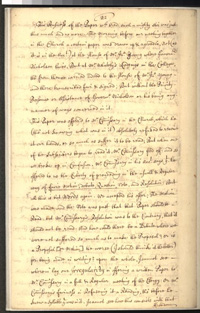 This Business of the Paper w.ch bred such a mighty stir was just
This Business of the Paper w.ch bred such a mighty stir was just
thus much and no more. The morning before our meeting together
in the Church a certain paper was drawn up & agreed to, Not (as
it is in the Acc.t) at the House of M.r Jn.o Young where Govern.r
Nicholson lives, But at M.r Whately's Lodgings in the College,
thô from thence carried indeed to the House of Mr. Jno: Young—
and there transcribed fair & signed; But without the Privity—
Presence or Assistance of Govern.r Nicholson or his being any—
manner of ways concerned in it.
This Paper was offerr'd to M.r. Comissary in the Church, which he
(thô not knowing what was in it) absolutely refused to receive
at our hands, or so much as suffer it to be read; But when one
of the Subscribers began to read it, M.r Comissary fled off: and so
we broke up in Confusion. M.r Comissary in his Acc.t says y.t he
offered to us the Liberty of proceeding in the usuall & Regular
way of faire Motion, debate, Question, Vote, and Resolution: But
all this is but Words again. We accepted his offer; The Motion
was made and the Vote was past that that Paper should be—
Read: but M.r Comissary's Resolution was to the Contrary, that it
should not be read. And how could there be a Debate where we
were not suffered so much as to make the Proposal? or is
a Proposal [or Motion] the worse (I should think it the better)
for being made in writing? upon the whole, I cannot see—
wherein lay our Irregularity in offering a written Paper to—
M.r Comissary in a full & Regular meeting of the Clergy: Or M.r
Comissary's fairness in Refuseing it a Reading, thô before he—
knew a Syllable y.t was in it. I cannot see how this consists with that
33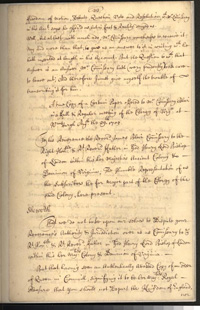 Freedom of Motion, Debate, Ouestion Vote and Resolution w.ch M.r Commissary
Freedom of Motion, Debate, Ouestion Vote and Resolution w.ch M.r Commissary
in his Acc.t says he offer'd us, but in fact & Reality denyed us.
Well, but at last, with much ado, M.r Comissary vouchsafes to receive it:
Nay and more than that, to give us an answer to it in writing w.ch he
hath inserted at length in his Account. But the Question to w.ch that
Answer is an Answer, M.r Comissary hath (very prudently) took care—
to leave out; And therefore I must give myself the trouble of—
transcribing it for him.
A true Copy of a Certain Paper offered to M.r Comissary Blair
in a Full & Regular meeting of the Clergy of Virg:a at—
W.msburgh Aug.st the 29.th 1705.
Right Hon:ble & R.t Rever.d Father in God Henry Lord Bishop
of London within this her Majesties Ancient Colony &—
Dominion of Virginia; The Humble Representation of us
the Subscribers the far Major part of the Clergy of the
said Colony, here present.
Sheweth
That we do not take upon our selves to Dispute your
Reverence's Authority & Jurisdiction over us as Comissary to ye
R.t Hon:ble & R.t Rever.d Father in God Henry Lord Bishop of London
within this her Maj:ties Colony & Dominion of Virginia.—
But that having seen an Authentically Attested Copy of an order
of Queen in Councill, signifying it to be her Maj:ties Royal—
Pleasure that You should not Depart the Kingdom of England,
34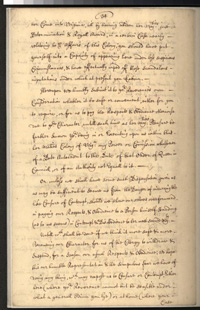 nor Come into Virginia, till by having abiden her Maj:ties just—
nor Come into Virginia, till by having abiden her Maj:ties just—
Determination & Royall Award, in a certain Case nearly—
relateing to ye Affairs of this Colony; you should have put—
yourself into a Capacity of appearing here under less suspicious
Circumstances, & have effectually wiped off those Scandalous—
imputations under which at present you Labour.—
Hereupon We humbly Submit it to yo.r Reverence's own—
Consideration whether it be safe or convenient, either for you
to require, or for us to pay the Respects & Obedience otherwise
due to yo.r Character, untill such time as her Maj:ties Pleasure be
further known Yo.r being in or Executing upon us within this—
her Maties Colony of Virg:a any Power or Comission whatsoever
of a Date Antecedent to the Date of that Order of Queen in
Councill, or of an Authority not Equall to it.—
Or unless we shall have some such Dispensation given us
as may be sufficient to Secure us from the Danger of incurring the
like Censure of Contempt, should we shew ourselves overforward—
in paying our Respects, & Obedience to a Person himself Standing
(as to us seems) in Contempt & Disobedience to her most sacred Maj:ty—
Untill w.ch shall be done if we think it more safe & more—
Becomeing our Character for us of the Clergy to withdraw &
Suspend, for a Season our usual Respects & Obedience; We hope
this our humble Representation & the Scrupulous fear we have of
doing any thing, w.ch may expose us to Censure or Contempt, Either
here (where yo.r Reverence cannot but be sensible under—
what a generall Odium you lye) or at home (where your—
35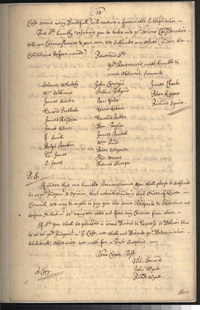 Case seems very Doubtfull) will receive a favourable Interpritation.—
Case seems very Doubtfull) will receive a favourable Interpritation.—
Thus S.r humbly desireing you to take into yo.r serious Consideration—
both our Circumstances & your own, We Subscribe our selves (under the—
Conditions before named)
Reverend S.r
Yo.r Reverence's most humble &
most Obedient Servants
Solomon Whately John Carnegie James Clack
W.m Williams Arthur Tillyard
Peter Kippax
James Sclater Bar: Yates
Richard Squire.
Edward Portlock Lewis Latane
James Boisseau Edward Butler
Jacob Ware Dan: Taylor
G: Smith James Burtell
Ralph Bowker W.m Rudd
Peter Wagener
Em: Jones
And: Monro
O: Jones
Thomas Sharpe
P: S:
If under this our Humble Remonstrance You shall please to Subscribe
it, as yo.r Judgem.t & Opinion, that notwithstanding that Order of Queen in
Councill, we may & ought to pay you the same Respects & Obedience as
before, & that in so doing we need not fear any Censure from above.—
If S.r you shall be pleased in terms Direct & Express to Deliver this
to us as yo.r Judgem.t in ye Case, we shall not Dispute yo.r Determination—
but Submitt; Otherwise we must for a Time Suspend.—
Vera Copia Test
Wil: Stanard
John Wyatt
Richd Wyatt
A Copy.
36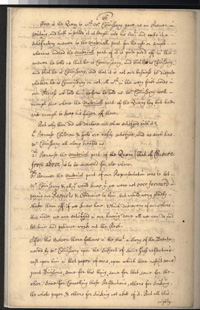 Here is the Query to w.ch M.r Comissary gave us an Answer in
Here is the Query to w.ch M.r Comissary gave us an Answer in
Writing, and hath inserted it at length into his Acc.t and calls it a—
Satisfactory answer to the Materiall part for the case or Scruple:—
whereas indeed the Materiall part of it is quite par'd off in the—
answer he tells us that he is Commissary, and that hee is Comissary,
and that he is Comissary, and that it is not our business to dispute
whether he is Commissary or not, all w.ch in the very first words in
our Address we told him before he told us. M.r Comissary well—
enough saw where the Materiall part of the Quaery lay, but had
witt enough to keep his finger off there.
But why then did we declare ourselves satisfyed with it?
- 1.stBecause Children & fools are easily satisfyed, and as such has
M.r Comissary all along treated us. - 2.dly Because the Material part of the Quaery (that of Censure
from above) is to be answer'd for else where. - 3.dlyBecause the Material of our Representation was to
let—
M.r Comissary & all ye world know y.t we were not over forward in
paying our Respects & Obedience to him, but would very gladly—
shake them off if we knew how: Which discovery of ourselves—
thus made we are satisfyed in our having done all we can do, and
let time and patience work out the Rest.
After this Answer there follows in the Acc.t a Story of the Debate—
moved by M.r Comissary upon the Subject of some Gross reflections—
cast upon him in that paper of ours, upon which there rose (it seems
great Divisions, some for this thing, some for that, some for the—
other. Some for Cancelling those Reflections, others for Sinking—
the whole paper, & others for Sinking not abitt of it. But all this—
37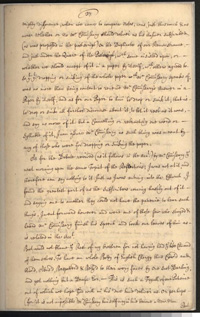 mighty difference, when we came to compare Notes, was just thus much &
mighty difference, when we came to compare Notes, was just thus much &
more. Whether or No M.r Comissary should deliver us his Answer subscribed
(as was proposed in the postscript) On the Duplicate of our Remonstrance,—
and just under the Quaere of the Postscript, w.ch some insisted upon, or—
whether we should accept of it in a paper by itself, wch. others agreed to.
So y.t y.t dropping or sinking of the whole paper w.ch M.r Comissary speaks of,
was no more than being content to receive M.r Comissary's Answer in a—
Paper by itself, and as for our Paper to him to drop or sink it, that is—
to drop or sink all farther discourse about it, to let it rest as it was,—
and say no more of it: but a Cancelling or retracting one word or—
Syllable of it, I can assure M.r Comissary no such thing was meant by—
any of those who were for dropping or sinking the paper.
As for the Debate revived (as it follows in the Acc.t) by M.r Comissary ye
next morning upon the same Topict of the Reflections; I was not at it, and.
therefore can say nothing to it. Just as I was entring into the Church, I
found the greatest part of us the Subscribers coming hastily out of it—
and saying one to another they could not have the patience to hear such
things, I went forward however and were one of those few who stayed &
heard M.r Comissary finish his Speech and took our leaves of him as—
is related in the Acc.t
But could not blame ye Rest of my brethren for not having had ye like Comand
of themselves. To have an whole Body of English Clergy thus Cow'd and
Aw'd, Abus'd, Bespatter'd & Bely'd to their very faces by One Scot Darling,
and yet nothing but a Deafe Ear,—This is such a Tryall of our Patience
out of which we hope God will in his due time deliver us. Or perhaps—
(for it is not impossible) M.r Comissary himself may in time become a New. Man.
38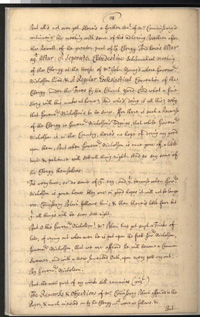 But all's not over yet. Here's a farther Acc.t of M.r Commissary's
But all's not over yet. Here's a farther Acc.t of M.r Commissary's
continueing the meeting with some of his adhering Brethren after
the Revolt of the greater part of ye Clergy. And here's Altar
ag.t Altar: A Seperate Clandestine Schismatical meeting
of the Clergy at the House of M.r John Young's where Governo.r
Nicholson lived: & A Regular Ecllesiastical Convention of the
Clergy under the Trees by the Church Yard. And what a fine
Story will this make at home? And who's doing is all this? Why
that Govern.r Nicholson's to be sure. For there is such a Recourse
of the Clergy to Govern.r Nicholson's lodgings, that while Govern.r
Nicholson is in the Country, there's no hope of doing any good
upon them, But when Govern.r Nicholson is once gone off, a little
time & patience will sett all things right. And so say some of
the Clergy themselves.
'Tis very true, so do some of y.m say: and y.t because when Gov.r
Nicholson is gone home they are in good hopes it will not be longe
ere Comissary Blair follows him; & then there's little fear but
y.t all things will
soon sett right.
But O this Govern.r Nicholson! M.r Blair has got such a Trick of
late, of crying out whenever he is put upon the frett Gov.r Nicholson,
Govern.r Nicholson, that we are affraid he will become a Common
Swearer, and with a new Invented Oath, upon every pett cry out;—
By Governr. Nicholson.
But the main part of my work still remaines (viz.t)
The Remarks & Objections of M.r Comissary Blair offered to the
Paper, & much insisted on by the Clergy, w.ch were as follows. &c.
39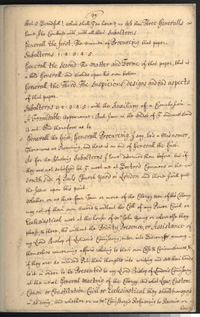 But O Dreadfull! what shall I do here? no less than Three Generalls—
But O Dreadfull! what shall I do here? no less than Three Generalls—
have I to Combate with, with all their Subalterns.
General the First, The Manner of Procureing that paper.
Subalterns 1: 2: 3: 4: 5.
General the Second: The Matter and Forme of that paper, this is
a bold Generall and stands upon his own bottom.
Generall the Third The Suspicious designs and bad aspects
of that paper.
Subalterns 1: 2: 3: 4: 5: with the Auxilary of a Conclusion—
A Formidable Appearance: But I am in the Midst of y.m and must stand
it out: And therefore as to
1. Generall the first, Generall Procureing. I say, he's a Misnomer,
There was no Procuring, and there is an end of Generall the first.
As for the Blustring Subalterns I have disarmed them before. but if
they are not satisfyed let y.m meet me at Doctor's Commons on the—
South Side of Pauls Church Yard in London and there I will putt
the Issue upon this point.
Whether or no three four Tenn or more of the Clergy Men of this Colony
may not of their own Accord & without the Call of any Power Civill or
Eccelesiastical meet at the house of M.r John Young or where else they
please, & there, thô without the Privity, Presence, or Assistance of
my Lord Bishop of London's Comissary, enter into Discourse among—
themselves concerning affairs relating to their own Case & Circumstances, &
if they are so minded Put their thoughts into writing and sett their hands
to it in order to be Presented to my Lord Bishop of London's Comissary.
at the next General Meeting of the Clergy. And what Law, Custom
Canon or Constitution Civil or Ecclesiastical they should transgress
in so doing, And whether or no M.r Comissary's Refuseing to Receive or—
40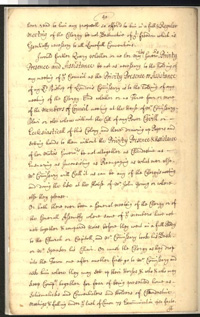 hear read to him any proposall so offer'd to him in a full & Regular
hear read to him any proposall so offer'd to him in a full & Regular
Meeting of the Clergy be not Destructive of y.t freedom which is
Essentially necessary to all Lawfull Conventions.
I would farther Quaery Whether or no her Maj:ties Govern.rs Privity
Presence and Assistance be not as necessary to the holding of
any meeting of ye Council as the Privity Presence or Assistance
of my L.d Bishop of London's Comissary is to the holding of any
meeting of the Clergy. And whether or no Three four or more
of the Members of Council meeting at the House of M.r Comissary—
Blair or else where Without the Call of any Power Civill or—
Ecclesiaticall of this Colony, and there drawing up Papers and
setting hands to them without the Privity Presence & Assistance
of her Majties Govern.r be not altogether as Clandestine as—
Ensnaring as Inconsisting as Preengaging as what ever else—
M.r Comissary will Call it as can be any of the Clergy's meeting
and doing the like at the House of M.r John Young or where—
else they please.
Or hath there ever been a General meeting of the Clergy or of
the Generall Assembly where some of ye members have not
mett together & compared Notes before they went in a full Body
to the Church or Capitoll, and M.r Comissary took his Desk—
or M.r Speaker his Chair. Or must the Clergy as they drop
into the Town one after another first go to M.r Comissary and
ask him where they may sett up their Horses, & who & who may
keep Comp:a together for fear of being presented home as—
Schismaticks and Conventiclers and Holders of Clandestine—
Meetings, & falling under ye lash of Canon 73 Excomunication ipso facto.
41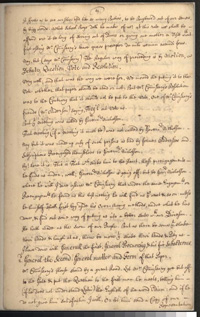 It fretts us to see ourselves used like so many Babies, to be Bugbear'd out of our Senses,
It fretts us to see ourselves used like so many Babies, to be Bugbear'd out of our Senses,
by bigg words. What School Boys doth he made of us? at this rate we shall be—
affraid ere it be long of Stirring out of Doors or giving one another a Visitt w.thout
first asking M.r Comissary's leave quaeso praeceptor da mihi veniam exeundi foras.
Nay, but (says M.r. Comissary) The Regular way of proceeding is by Motion,—
Debate, Question, Vote and Resolution.
Very well; and that was the way we were for. We moved the putting it to the
Vote whether that paper should be read or not. But M.r Comissary's Resolution
was to the Contrary that it should not be put to the Vote, One of M.r Comissary's
friends (M.r Anderson) saying THEY'L out Vote us.
But yt meeting was called by Govern.r Nicholson.
That meeting (if a meeting it must be) was not called by Govern.r Nicholson.—
Nay but it was made up only of such persons as had by former Addresses and—
Subscriptions Preengaged themselves to Govern.r Nicholson.
Ay! here it is: This is That w.ch sticks him to the Heart, these preengagements—
he finds us under, well; Govern.r Nicholson is going off: but be Gov.r Nicholson—
where he will I dare assure M.r Comissary that under the same Engagem.ts or
Preengagem.ts he found us this last meeting he will find us ye next & so on: unless
he himself shall first lay aside his Over-Awing methods, undoe what he has
done, & find out some way of putting us into a better state w.th our Diocesan.—
He hath made us the scorn of our People. But as there be some yt shake
their heads & laugh at us, there be more y.t shake their head & Pitty us.—
I have done with Generall the first, General Procureing, & his five Subalternes.
2.d General the Second. General matter and Form of that Paper.
M.r Comissary's House stand by a great Road. Let M.r Comissary goe but off
to the Gate & put the Question to the first man he meets, telling him—
(if he does not understand Latin) the English of the word Odium; and if he
do not give him Satisfaction, I will. Or let him send a Copy of our—
42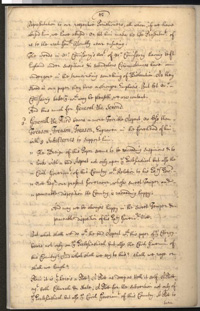 Representation to our respective Parishioners, all whom, if we have
Representation to our respective Parishioners, all whom, if we have
abused him, we have abused: Or let him make the like Presentm.t of
us to the next Gen:ll Assembly near ensueing.
The words in M.r Comissary's Acc.t of M.r Comissary having left
England under suspitious & scandalous Circumstances have—
undergone in the transcribing something of Dislocution. As they
stood in our paper they bore a stronger Emphasis. But let M.r
Comissary take y.m wch way he pleaseth, we are content.
And thus much for General the Second.
3.d Generall the Third bears a more Terrible Aspect, no less than—
Treason, Treason, Treason, Engraven in the forehead of him:
with 5 Subalternes to Support him.
″The Design of this Paper seems to be exceeding Suspicious & to
″look with a bad Aspect not only upon ye Ecclesiastical but also the
″Civil Governm.t of this Country w.th Relation to his Ex:cyEdw.d—
″Nott Esq.r our present Governour, whose sweet Temper and—
″peaceable disposition the Country is exceeding happy.
And may we be alwayes happy in the Sweet Temper &
peaceable disposition of his Ex:cy Govern.r Nott.
But what shall we do w.th the bad Aspect w.ch this paper of ye Clergy—
bears not only on ye Ecclesiastical but also the Civil Governmn.t of
this Country? And what shall we say to this? shall we rage or
shall we laugh?
Plain it is y.t here's a Plott! A Plott as deep as Hell it self. A Plott
ag.t both Church & State; A Plott for the subvertion not only of
ye Ecclesiastical but also ye Civil Governmn.t of this Country: A Plott to
43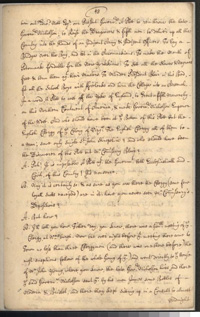 turn out Edw.ad Nott Esq.r our Present Govern.r A Plott to reinthrone the late—
turn out Edw.ad Nott Esq.r our Present Govern.r A Plott to reinthrone the late—
Govern.r Nicholson; to Raise the Dragooners & fifth men: to deliver up all the
Country into the Hands of an Indigent Army & Indigent Officers: To lay a—
Bridge over the Bay, and let in the Accomackians: To make the mouth of
Potomack fordable for the New Yorkkians: To Sett all the Slaves & Negroes
free & Arm them ag.t their Masters: To Murder President Blair in his Bed,—
fit all the School Boys with Firelocks and turn the College into an Arsenal.—
In a word, A Plott to cast off the Yoke of England, to Erect a fifth Monarchy—
on this Northern Continent of America, & make Govern.r Nicholson Emperor
of the West. And who should have been at ye Bottom of this Plott but the—
English Clergy of ye Colony of Virg:a The English Clergy all of them to—
a man; save only Single S.t John Shropshire? and who should have been
the Discoverer of this Plott but M.r Comissary Blair?
A. Puh! It is impossible A Plott ag.t the Governm.t both Ecclesiastical and—
Civil, of this Country! It's nonsence.
B. Nay it is certainly so: & as sure as you are there the Clergy (some few
loyall Scotts excepted) are in it. have you never seen M.r Comissary's
Depositions?
A. But how?
B. I'll tell you how. T'other day, you know, there was a Gen:ll meeting of ye—
Clergy, at Wmsburgh. Now the over night before y.t meeting there come to
Town no less than three Clergymen (and there was one there before) the
most suspitious fellow of the whole Gang of y.m) and went directly to ye House
of M.r John Young, where, you know, the late Gov.r Nicholson lives, and there
ye said Govern.r Nicholson sent y.m by his man James some Bottles of—
Medera & Bristol, and there they kept sitting up in a Consult to almost
44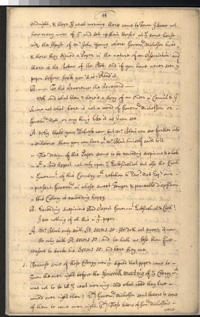 Midnight, & there ye next morning there came to Town I know not
Midnight, & there ye next morning there came to Town I know not
how many more of y.m and Sett up their Horses at ye same house—
viz. the House of M.r John Young where Govern.r Nicholson lives,
& there they Signed a Paper in the nature of an Association: and
there is the Bottom of the Plott: And if you have never seen y.t
paper before, look you it is: Read it.
B.— To his Reverence the Reverend—
Well and what then? here's a Story of an Order in Council & I
know not what, here is not a word of Govern.r Nicholson or—
Govern.r Nott, or any thing like it as I can see.
A. Why that's your Dulness now, but M.r Blair can see father into
a milstone than you can, hear w.t M.r Blair himself saith to it
″The design of this Paper seems to be exceeding suspicious & to look
″w.th a Bad Aspect not only upon ye Ecclesiastical but also the Civil
″Governm.t of this Country w.th relation to Edw.d Nott Esq.r our—
″present Govern.r in whose sweet Temper & peaceable disposition
″this Colony is exceeding happy.
B. Exceeding suspicious Bad Aspect Governm.t Ecclesiastical & Civil!
I see nothing of all this in y.t paper.
A. M.r Blair only saith It seems so: He doth not swear it now:
He only saith It seem so: and he hath no less than five—
reasons to back his Seem So; and here they are
1. Because some of those Clergy men y.t signed that paper came to—
Town the over night before the General Meeting of ye Clergy w.ch
was not to be till ye next morning. And what need they have—
comed over night then? 2.dly Govern.r Nicholson sent letters to some
of them to come over night. 3.dly These letters of Gov.r Nicholson's—
45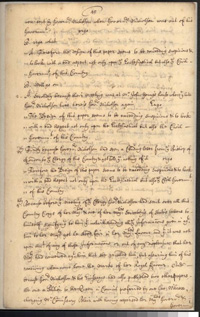 were sent by Govern.r Nicholson when Govern.r Nicholson was out
of his
were sent by Govern.r Nicholson when Govern.r Nicholson was out
of his
Governm.t ergo
B. ergo what.
"A. Therefore the design of this paper seems to be exceeding suspicious &
"to look with a bad aspect not only upon ye Ecclesiastical but also ye Civil—
"Governm.t of this Country.
B. Well go on.
2. A. Secondly because their meeting was at M.r John Young's house where y.e late
Gov.r Nicholson lives. here's Gov.r Nicholson again Ergo
″The Design of this paper seems to be exceeding suspicious & to look
″with a bad Aspect not only upon the Ecclesiastical but also the Civil—
″Governm.t of this Country.
3.dly Thirdly because Govern.r Nicholson had seen a Chiding letter from ye Bishop of
London to ye Clergy of this Country & yet told y.m nothing of it ergo
″Therefore the Design of this paper seems to be exeeding suspicious & to look
″with a bad Aspect not only upon the Ecclesiastical but also ye Civil Governm.t
of this Country.
4.thly Because before y.t meeting of ye Clergy Gov.r Nicholson had sent over all this—
Country Copys of her Maj:ties & one of her Maj:ties Secretary's of State's letters to—
himself signifying to him y.t notwithstanding all ye Informacons given in ag.t
him to her Maj:ty yet he stood fair in her Maj:ties favour and y.t it was not
upon Acc.t of any of those Informacons or out of any displeasure that her
Maj:ty had conceived ag.t him that she recalled him, but assuring him of his
receiving when come home the marks of her Royal Favour. And—
because Gov.r Nicholson & his Emissarys had also published two other papers,—
the one a Petition to the Queen in Council preferred by one Geo: Wilcox,—
charging M.r Comissary Blair with having aspersed her Maj:ties Govern.r &—
46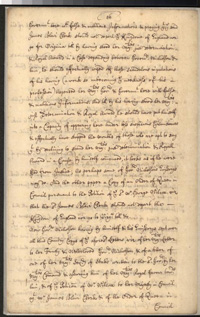 Governm.t here w.th false & malitious Informations & praying y.t ye said
Governm.t here w.th false & malitious Informations & praying y.t ye said
James Blair Clerk should not depart ye Kingdome of England nor
go for Virginia till by having stood her Maj:ties just determination—
& Royal Award in a Case depending between Govern.r Nicholson &
him, he should effectually wiped off those scandalous imputations
of his having (a work so unbecoming ye meekness of his—
profession) Aspersed her Maj:ties Gov.r & Governm.t here with false
& malitious Informations: And till by his having stood her Maj:ties—
just Detrmination & Royal Award, he should have put himself
into a Capacity of appearing here under less suspicious Circumstances
& effectually have stopped the mouths of those who are apt to say
y.t by declining to stand her Maj:ties just determination & Royall
Award in a Cause by himself comenced, it looks as if he were
fled from Justice; As perhaps some of Gov.r Nicholson's Emissarys
may do. And the other paper a Copy of an Order of Queen in
Council pursuant to the Petition of y.e s.d M.r George Wilcox. viz.
that the s.d James Blair Clerk should not depart the—
Kingdom of England nor go to Virg:a till &c.
Now Gov.r Nicholson having by himself & his Emissarys sent over
all this Country Copys of ye afores.d Letters, viz. of her Maj:ties Letter
to her Trusty & Wellbeloved Gov.r Nicholson, & of a letter of
one of her Maj:ties Sec.ry of State's written to the s.d Gov.r by her
Maj:ties Comand & assuring him of her Maj:ties Royal favour tow.ds
him, & of ye Peticon of M.r Wilcox to her Majesty in Council
ag.t M.r James Blair Clerk & of the Order of Queen in—
47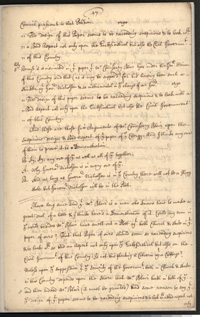 Council pursuant to that Petition. ergo
Council pursuant to that Petition. ergo
″The design of this Paper seems to be exceeding suspicious & to look w.th
″a Bad Aspect not only upon the Ecclesiastical but also the Civil Governm.t
″of this Country.
5.thly Because it is insinuated in y.t paper y.t M.r
Comissary Blair lyes under the Gen:ll Odium
of the Country and that (as it may be suppos'd) for his having been such a—
Stickler ag.t Gov.r Nicholson & so instrumental in ye change of our Gov.rs ergo
″The design of this paper seems to be exceeding suspicious & to look with a
″Bad Aspect not only upon the Ecclesiastical but also the Civil Government
″of this Country.
And these are those five Arguments of M.r Comissary Blair upon the—
Suspicious design & Bad Aspect of y.t paper of ye Clergy. And I think any one
of them to prove it to a Demonstration.
B. Ay, Ay, any one of y.m as well as all of y.m together.
A. Why, Govern.r Nicholson is in every one of y.m
B. And as long as Govern.r Nicholson is in ye Country, there will not be a Hogg
Stole but Governor Nicholson will be in the Plott.
I have long since said y.t M.r Blair is a man who knows how to make a
great deal of a little & I think here's a Demonstracon of it. Could any man in
ye world besides M.r Blair have smelt out a Plott ag.t both Church & State in y.t
paper of ours? That that Paper of ours should seem so exceeding suspicious
& to look w.th so bad an Aspect not only upon ye Ecclesiastical but also on the—
Civil Governm.t of this Country. Is not this planting a Culverin ag.t a Cabbage?
Unless upon ye supposition y.t ye Security of the Governm.t both in Church & State—
in this Country depends upon the Share that M.r Blair hath in both of y.m—
and then indeed M.r Blair (it must be granted) had some reason to say y.t
ye design of y.t paper seems to be exceedingly suspicious & to look w.th a bad aspect not
48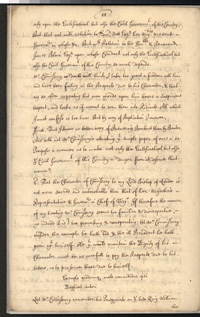 only upon the Ecclesiastical but also of the Civil Governm.t of this Country:
only upon the Ecclesiastical but also of the Civil Governm.t of this Country:
But that not with relation to Edw.d Nott Esq.r her Maj:ties present—
Govern.r in whose &c. But w.th Relation to the Hon:ble & Reverend—
James Blair Esq.r upon whose Conduct not only the Ecclesiastical, but
also the Civil Governm.t of this Country so much depends.
M.r Comissary no doubt will think I take too great a freedom with him
and have been failing in the Respects due to his Character, & that
my so often repeating his own words upon him bears a Suspicious
Aspect, and looks as if meant to turn them into Ridicule. All which
I must confess is too true. But by way of Replication I answer.
First, That I know of no better way of Answering Bombast than by Banter.
And doth not M.r Comissary's attacking y.t simple paper of ours in so
Pompose a manner as to make not only the Ecclesiastical but also
ye Civil Governm.t of this Country in danger from it, deserve that name?
2.d. That the Character of Comissary to my Lord Bishop of London is
not more Sacred and untouchable than that of her Majesties—
Representative & Govern.r in Chief of Virg:a If therefore the manner
of my treating M.r Comissary seems too familiar & disrespective,—
(as indeed it is) too provoking & exasperating: let M.r Comissary
consider the example he hath led, & the ill Precedent he hath—
given ag.t himself. He y.t would maintain the Dignity of his—
Character must be as carefull to pay the Respects due to his—
betters, as to preserve those due to himself.
Examplo quodcunq malo committitur ipsi
Displicet autori.
Let M.r Comissary remember his Panegyrick on ye late King William
the
49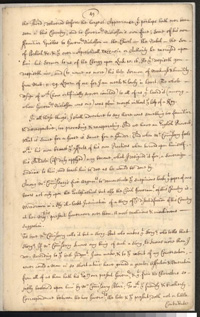 the Third, delivered before the largest Appearance y.t perhaps hath ever been
the Third, delivered before the largest Appearance y.t perhaps hath ever been
seen in this Country, and to Govern.r Nicholson's own face; Some of his own
Familiar Epistles to Govern.r Nicholson—the Churl—the Nabal—the Son—
of Belial &c. & ye over-Apostolicall [Āaéénóìa] or Authority he exercised upon
him: his Sermon to us of the Clergy upon Luk. 10:16, He y.t despiseth you—
depiseth me; and (to name no more) his late Sermon of Meekness & humility—
from Matt: 11:29. Learn of me for I am meek & lowly in heart. The whole—
design of w.ch (how artificially soever couched) to all of us y.t heard it (among—
whom Govern.r Nicholson was one) was plain enough without ye help of a Key.
In all these things, I shall adventure to say there was something too familiar
& disrespective, too provoking & exasperating. And we have an English Proverb,
What is Sauce for a Goose is Sauce for a Gander: And when M.r Comissary feels
w.th his own breast ye effects of his own Practises when turned upon himself,—
this Antidote (if duly applyed) may become, what I assigned it for, a Sovereign—
medicine to him, and teach him to doe as he would be done by.
Among M.r Comissary's five Argum.ts to demonstrate ye suspicious look y.t paper of ours
bears not only upon the Ecclesiastical but also the Civil Governm.t of this Country is—
Wiredrawn in a Sly ill-lookt Insinuation of a Story of ye dissatisfacon of this Country
at her Maj:ties present Governour over them. A most malicious & mischievous—
Suggestion.
'Tis true M.r Comissary calls it but a Story. But who makes y.t Story? who tells that
story? If M.r Comissary knows any thing of such a Story, he knows more than I
doe. According to ye best Judgm.t I can make, & to ye extent of my Conversation,—
never could a Man in so short a time have gained a greater Affection & Veneration
from all of us than hath his Ex:cy our present Govern.r, & y.t from the Characters so—
justly bestow'd upon him by M.r Comissary Blair; To w.ch ye friendly & brotherly—
Correspondence between the two Govern.rs, the late & ye present, doth not a little
50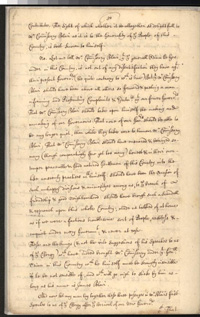 Contribute. The Sight of which whether it be altogether so delightfull to
Contribute. The Sight of which whether it be altogether so delightfull to
M.r Comissary Blair as it is to the Generality of ye People of this—
Country, is best known to himself.
No. Let me tell M.r Comissary Blair, y.t ye generall Odium he lyes
under in this Country, is not out of any dissatisfaction they have ag.t
their present Govern.r (the quite contrary to w.ch is true) But y.t M.r Comissary
Blair should have been above all others so forward & pushing a man—
in forming and Presecuting Complaints & Ejectm.ts ag.t our former Govern.rs:
That M.r Comissary Blair should take upon himself the making and
unmaking of our Governours: That none of our Gov.rs should be able to
be any longer quiet, than while they take care to humour M.r Comissary
Blair; That M.r Comissary Blair should have ensnared & betrayed so—
many (though comparatively few yet too many) honest & in their own—
temper peaceable & Good natured Gentlemen of this Country into the
like unseemly practises w.th himself: should have been the Occasion of
such unhappy divisions & animosityes among us, to ye breach of—
friendship & good Neighbourhood: should have brough such a Scandall
& reproach upon this whole Country; made us talked of at home
as if we were a factious troublesome sort of People, restless &—
unquiett under every Governmt; & never at ease.
These are the things (& not the vile suggestions of his Speeches to us
of ye Clergy) w.ch have indeed brought M.r Comissary under yt Gen:ll
Odium in this Country w.ch he himself must be strangely insensible
if he be not sensible of, and w.ch will go nigh to stick by him as—
long as his name is James Blair.
And now let any man lay together these three passages in M.r Blair's first
Speeches to us of ye Clergy after ye Arrival of our New Govern.r.
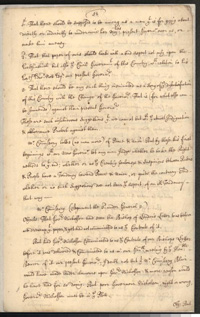
- 1st. That there should be supposed to be among us a man y.t is for going about
directly or indirectly to undermine her Maj:ties present Govern.r over us, or—
make him uneasy. - 2d. That that paper of ours should look with a bad Aspect not only upon the—
Ecclesiastical but also ye Civil Governm.t of this Country, w.th relation to his—
Ex:cy Edw.d Nott Esq.r our present Govern.r - 3.That there should be any such thing insinuated as a Story of ye dissatisfaction
of this Country with the Change of the Govern.r That is (for what else can—
be Innuendo) against their present Govern.r
These are such mischievous Suggestions y.t we cannot but w.th ye utmost Indignation
& abhorrence Protest against them.
M.r Comissary talks (no man more) of Peace & Union. But by these his first
beginnings w.th our New Govern.r let any man Judge whether he take the Right
methods to y.t end; whether or no ye Creating Jealousys & Suspicions between Rulers
& People have a Tendency toward Peace & Union, or quite the contrary: And—
whether or no such Suggestions doe not bear ye Aspect of an ill Tendency—
that way—
M.r Comissary. (Argument the 3.d under General 3.)
Objects. That Govern.r Nicholson had seen the Bishop of London's Letter to us before
we drew up y.t paper, & yet had not communicated to us ye Contents of it.
But had Gov.r Nicholson Comunicated to us the Contents of our Bishops Letter
before it was delivered & Comunicated to us in our Gen:ll meeting by ye Hon:ble—
Bearer of it our present Govern.r; I doubt not but y.t M.r Comissary Blair—
would have made louder clamours upon Gov.r Nicholson: & more reason would
he have had for so doing. But poor Governour Nicholson, right or wrong,
Govern.r Nicholson must be in ye Plott.
52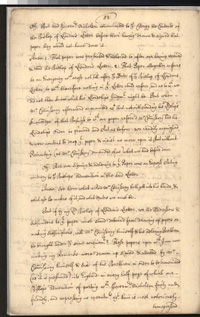 Obj: But had Govern.r Nicholson comunicated to ye Clergy the Contents of
Obj: But had Govern.r Nicholson comunicated to ye Clergy the Contents of
the Bishop of London's Letter before their having drawn & signed that
paper they would not have done it.
Answ. 1. That paper was presented & adhered to after our having received
& read the Bishop of London's Letter. 2: That Paper altogether referrs
to an Emergency w.ch arose not till after ye Date of ye Bishop of Londons
Letter, to w.ch therefore nothing in y.t Letter could referr, and as to w.ch we
did not then know what this Lordships Judgem.t might be. But when—
M.r Comissary afterward acquainted us that notwithstanding his L.dships
knowledge of that Business to w.ch our paper referr'd, M.r Comissary had his—
Lordships Order to proceed and Act as before: we readily acquiesced,
& were content to drop y.t paper & insist no more upon it, But without
Retracting (as M.r Comissary demanded of us) what we had before done.
Obj: But our Signing & adhering to y.t Paper was an Express Acting
contrary to ye Bishops Admonition in the said Letter
Answ: See here what a Rod M.r Comissary hath gott into his hands, &
what use he makes of it, and what Mutes we must be.
But if my L.d Bishop of London's Letter, we the Addressers &
Subscribers to y.t paper must stand debarr'd from drawing up papers or
making Subscriptions, will M.r Comissary himself & his adhering Brethren
be brought under ye same confinem.t? These papers upon w.ch I am now
making my Remarks were drawn up signed & attested by M.r—
Comissary himself & Six of his Brethren in order to be transmitted
(as it is presumed) into England: in every half page of which our—
Bishop's Admonition of parting w.th Govern.r Nicholson fairly and
friendly, and expressing no resentm.ts ag.t him is most notoriously—
53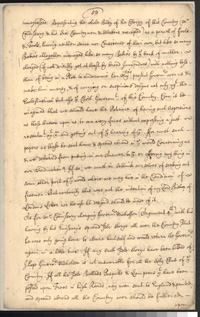 transgressed: Representing the whole Body of the Clergy of this Country (M.r—
transgressed: Representing the whole Body of the Clergy of this Country (M.r—
Comissary & his Six Countrymen & Attesters excepted) as a parcell of fools—
& Tools, having neither sense nor Conscience of their own, but like so many
Babies altogether managed like so many Babies by ye back of another:—
charged (if not directly yet at least by broad Innuendoes) with nothing less—
than of being in a Plott to undermine her Maj:ties present Govern.r over us &c—
make him uneasy, & of carrying on suspicious designs not only ag.t the—
Ecclesiastical but also ye Civil Governm.t of this Country. Can it be—
imagined that we should have the Patience of having such Aspersions
as these thrown upon us to our very faces without expressing a just—
resentm.t ag.t y.m and getting out of ye hearing of y.m For must such—
papers as these be sent home & spread abroad in ye world Concerning us
& we debarr'd from putting in our Answer to y.m or offering any thing in
our vindication? If so; we must e'n by think ourselves of seeking out
some other part of ye world where we may live in the Condition of—
freemen. But certainly this was not the intention of my Lord Bishop of
Londons Letter nor the use he design'd should be made of it.
As for M.r Comissary charging Govern.r Nicholson (Argument 4.th) with his
having by his Emissary's spread Idle Storys all over the Country, That
he was only going home to cleare himself and would return the Govern.r
again in a little time: If any such Idle Storys have been talked of,
I hope Govern.r Nicholson is not answerable for all the Silly Chatt of ye—
Country. If all the Idle Ballads Pasquills & Lampoons y.t have been—
posted upon Trees in high Roads, nay even sent to England & printed,
and spread abroad all the Country over should be fathered—
54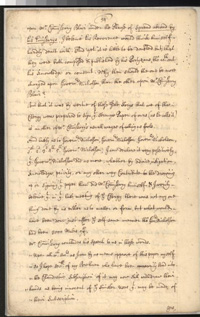 upon M.r Comissary Blair under the Phrase of Spread abroad by
upon M.r Comissary Blair under the Phrase of Spread abroad by
his Emissarys, I believe his Reverence would think himself—
hardly dealt with. And yet it is little to be doubted but that
they were both composed & published by his Partyzans, thô w.thout
his knowledge or consent. Why then should the one be more
charged upon Govern.r Nicholson, than the other upon M.r Comissary
Blair?
But that it was by verture of these Idle Storys that we of the—
Clergy were prepared to Sign y.t Strange Paper of ours (as he calls it)
is another of M.r Comissary's usuall wayes of calling us fools.
And lastly as to Govern.r Nicholson, Govern.r Nicholson, Govern.r Nicholson,
1.st 2.d 3.d 4.th 5th Govern.r Nicholson; I can declare it very positively,
y.t Govern.r Nicholson did no more, whether by advice, instigation,
knowledge, privity, or any other way Contribute to the drawing
up or signing y.t paper than did M.r Comissary himself. & I verily—
believe y.t in y.t last meeting of ye Clergy there was not any one
thing done by us either as to matter or form, but what would—
have been done just after ye self same manner thô Gov.r Nicholson
had been 3000 Miles off.
M.r Comissary concludes his Speech to us in these words.
″Upon all w.ch Acc.ts as I can by no means approve of this paper myself
″so I hope sev.ll of my Brethren who have been unwarily lead into—
″the Clandestine Subscription of it may now still withdraw their—
″hands as being innocent of ye Sinister Uses y. may be made of
″their Subscription.
55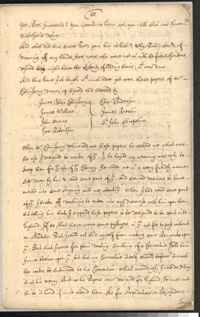 Yes, Poor Innosents! You meant no harm not you. All this was Govern.r
Yes, Poor Innosents! You meant no harm not you. All this was Govern.r
Nicholson's doing.
And what did this sweet Turn gain him at last? Why, That instead of—
drawing off any hands, two more who were not in with the first Subscribers,
desired they might have the Liberty of Adding theirs; w.ch was done.
And thus have I at length w.th much adoe got over these papers of M.r
Comissary drawn up Signed and Attested by
James Blair Comissary Cha: Anderson
James Wallace James Brechin
John Monro S.t John Shropshire
Geo: Robertson
When —M.r Comissary delivered me these papers he asked me what was—
the use I designed to make of y.m, y.t he hoped my meaning was only to—
keep them for ye use of ye Clergy. He made me in a very friendly manner
Sitt down by him & read some part of y.m and seemed desirous to have—
entred into some Arguing with me about ym: When I had read some part
of y.m I broke off declining to enter into any discourse with him upon them,
but telling him that I supposed these papers to be designed to be sent into—
England. If so, that there were some passages in y.m not fitt to pass without
an Antidote: That I could not bind myself from making some Remarks upon
y.m: But that I were for plain dealing: Something of a Corrective I told him
I must bestow upon y.m, but that my Corrective itself should before it crost
the water be Submitted to his Correction. Which accordingly I now do, & lay
it at his mercy. But as his Papers are designed for England, he must not
think it hard if mine attend them. As for Replications or Rejoynders—
56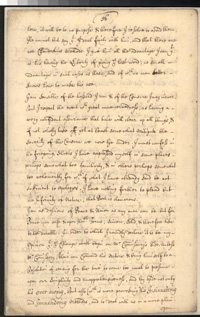 here, it will be to no purpose & therefore I resolve to avoid them.
here, it will be to no purpose & therefore I resolve to avoid them.
He cannot but say y.t I deal fairly with him, and that there are
noe Clandestine Methods. I give him all the advantage I can y.t
is his having the Liberty of giving ye last word; no small—
advantage in such cases as these, and of w.ch no man better—
knows how to make his use.
I am Sensible of the hassard I run & of the Censure I may incurr.
But I expect the event w.th unconcernedness, as having a—
very confident assurance that time will clear up all things, &
if not wholly take off yet at least somewhat Mitigate the—
severity of the Censure we now lye under. I must confess in
the foregoing Sheets I have expressed myself in some places—
perhaps somewhat too familiarly, & in other perhaps somewhat
too vehemently, for w.ch If what I have already said be not
sufficient to apologyes, I have nothing further to plead but
the Infirmity of Nature; that Part is clamarous.
I am as desirous of Peace & Union as any man can be: but for
Peace upon safe & upon Hon:ble Terms; Sincere, Solid, & therefore like
to be durable. In order to which I roundly declare it to be my—
Opinion y.t ye Change must begin on M.r Comissary's side. Unless
M.r Comissary Blair can Comand his Nature & bring himself to a—
Resolution of ceasing for the time to come too much to presume—
upon our Simplicity and Unapprehensiveness, and lay aside not only
his Over Awing, But also (w.ch is more provoking) his Insinuateing
and Innuendoing Methods, and to deal with us in a more plain—
57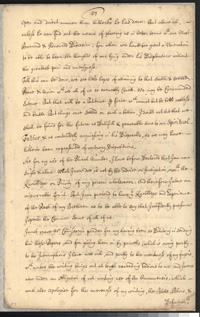 Open and direct manner than hitherto he has done: But above all,—
Open and direct manner than hitherto he has done: But above all,—
unless he can find out the means of placenig us in better terms w.th our Most
Reverend & Honoured Diocesian; for whom we have too great a Veneration
to be able to bear the thoughts of our lying under his Displeasure without
the greatest pain and uneasyness.
Till this can be done, we see little hopes of attaining to that stable & settled—
Peace & Union w.ch we all of us so earnestly Covett. We may be Commanded
Silence: But that will be a Patience P force w.ch cannot but be both restless—
and brittle. But things once settled on such a bottom, I doubt not but that we—
shall be found for the future as Dutifull & peaceable sons of our Spiritual—
Father, & as contentedly acquiescing in his Disposalls, as we may have—
hitherto been represented of contrary Dispositions.
As for my use of the Plural Number, I have before Declared that I am now
Single & alone: What I now doe is not by the advice or Instigation, or w.th the—
Knowledge or Privity of any person whatsoever: And therefore I alone am
answerable for it. But I can pretend to have y.t Knowledge and Experience
of the Rest of my Brethren as to be able to say that I confidently presume
I speak the Common Sence of all of us.
I must crave M.r Comissary's pardon for my having been so Dilatory in sending
him these Papers, and for giving them in by parcells, which is owing partly—
to the Interruptions I have mett with, and partly to the weakness of my fingers,
w.ch makes the writing things out at length exceeding tedious to me: and I were
now under an Obligation of not making use of An Amanuensis, which—
must also Apologise for the uneveness of my writing, the Blotts, Blurs, &
58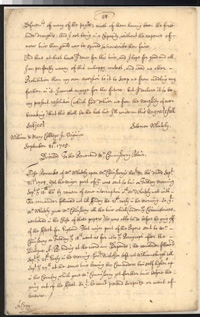 Defacem.ts of many of the pages; most of them having been the first
Defacem.ts of many of the pages; most of them having been the first
rude draughts: And I not being in a Capacity, without the expence of—
more time than could now be spared, to transcribe them faire.
And thus at last I have done for this time, and I hope for good and all.
I am perfectly weary of this unhappy contest, and need no other—
Prohibition than my own aversion to it to keep me from medling any
farther in it. I cannot engage for the future: but I declare it to be—
my present resolution (which God deliver me from the Necessity of ever
breaking) that this shall be the last time I'll write on this Ungratefull
Subject
Solomon Whately.
William & Mary Colledge In Virginia
September 21.st 1705.
Directed To the Reverend M.r Comissary Blair.
These Remarks of M.r Whately upon M.r Comissary's Acc.t &c. thô dated Sep.t
21.st 1705, Yet the Major part of y.m was sent to him on Tuesday Morning
Sep.t ye 18.th thô by reason of some interruption w.ch M.r Whately mett with—
The remainder followed not till Friday the 21st. early in the Morning. So y.t
M.r Whately gave M.r Comissary all the time which (under ye Circumstances—
mentioned in the Close of those papers) he was able to do before the going off
of the Fleet for England. That major part of the Papers sent to M.r—
Comissary on Tuesday ye 18th. went as far as to ye Paragraph after the—
Dialogue A:B: ending at the word—Depends; the remainder follow'd
Sep.t ye 21.st Early in the morning. Gov.r Nicholson left not Williamsburgh till
Sep.t ye 27.th at the same time leaving the Commodore himself higher up
in the Country, which gave M.r Commissary yet farther time before the—
going out of the Fleet. So y.t he cann't pretend Surprise or want of
leasure.
A Copy.
59 60